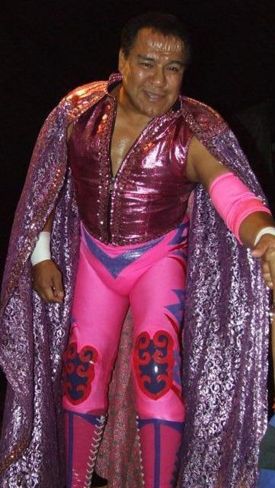Villano III: Difference between revisions
Suplexmasta (talk | contribs) mNo edit summary |
I Like Lucha (talk | contribs) |
||
| (197 intermediate revisions by 24 users not shown) | |||
| Line 1: | Line 1: | ||
== Profile == | == Profile == | ||
{{bioFields| | {{bioFields| | ||
|image= | |image=PARK071.jpg | ||
|name=Villano III (Villano Tercero) | |name=Villano III (Villano Tercero) | ||
|realName=Arturo Díaz Mendoza | |realName=Arturo Díaz Mendoza | ||
|nicknames=El Rey Arturo (King Arthur), La Pantera Rosa (The Pink Panther) | |nicknames=El Rey Arturo (King Arthur), La Pantera Rosa (The Pink Panther) | ||
|nameHistory=Ray Rosas (debut), Pulpo Blanco, Mancha Roja, Búfalo Salvaje, Rokambole (?? - 01/73), Villano III (01/73 - ) | |nameHistory=Ray Rosas (debut, 1966,Ciudad Neza), Pulpo Blanco, Mancha Roja y Rokambole (Arena Caracol) , Búfalo Salvaje (Arena Adolfo López Mateos) , Rokambole (?? - 01/73), Villano III (01/73 - Arena KO al Gusto) | ||
|family=[[Ray Mendoza]] (father), [[Villano I|Villanos I]], [[Villano II|II]], [[Villano IV|IV]], [[Villano V|V]] (brothers), [[La Infernal]] (wife) | |family=[[Ray Mendoza]] (father), [[Chico Mendoza]] (uncle) , [[Villano I|Villanos I]], [[Villano II|II]], [[Villano IV|IV]], [[Villano V|V]] (brothers), [[Difunto I]] (half-brother), [[La Infernal]] (wife), [[El Hijo del Villano III]], [[Villano III Jr.]] (sons), [[Rokambole Jr.]], [[Villano V Jr.]] (nephews); see [[Los Villanos]] | ||
|maestro=[[Felipe Ham Lee]], [[Ray Mendoza]] | |maestro=[[Andrés Reyes]], [[Acorazado Moreno]], [[Chico Hernández]], [[Felipe Ham Lee]], [[Ray Mendoza]], [[Villano I]], [[Villano II]], [[Costeño Nava]], [[Pedro Nieves]] | ||
|birthdate=[[March 23]], [[1952]] - [[Mexico City]] | |birthdate=[[March 23]], [[1952]] or [[January 21]], [[1953]] - [[Mexico City]] | ||
|obituarydate= | |obituarydate=[[August 21]], [[2018]] | ||
|debut=[[January 29]], [[1970]] - [[Nezahualcoyotl]], [[Mexico State]] | |debut=[[January 29]], [[1970]] - [[Nezahualcoyotl]], [[Mexico State]], as Villano III, [[71/10/28]], Veracruz, as Villano, (not Villano III), Arena Ecatepec, [[1971/11/21]] | ||
|lostmaskto=[[Atlantis]] - [[March 17]], [[2000]] - [[Arena México]] | |lostmaskto=[[Atlantis]] - [[March 17]], [[2000]] - [[Arena México]] | ||
|height=5'7"/170 cms | |height=5'7"/170 cms | ||
|weight= | |weight=198 lbs/90 kg | ||
|signatureMoves=[[DDT]], [[Legdrop]], [[Media Cerrajera]], [[Senton]] | |signatureMoves=[[DDT]], [[Legdrop]], [[Media Cerrajera]], [[Senton]], [[cristo negro]] | ||
|titles=[[UWA World Welterweight Title]], [[UWA World Light Heayvweight Title]] (2), [[WWF World Light Heavyweight Title]] (7), [[UWA World Junior Light Heavyweight Title]], [[WWC Puerto Rican Title]] (2), [[CMLL World Light Heavyweight Title]], [[National Trios Titles]] (w/ [[Villano V]] & [[Dos Caras]]), [[National Atomicos Titles]] (w/[[Villano IV|Villanos IV]] & [[Villano V|V]] & [[Pierroth Jr.]]), [[AAA Americas Trios Titles]] (w/ [[Villano IV|Villanos IV]] & [[Villano V|V]]), [[IWRG Trios Titles]] (w/ [[Villano IV|Villanos IV]] & [[Villano V|V]]) | |titles=[[UWA World Welterweight Title]], [[UWA World Light Heayvweight Title]] (2), [[WWF World Light Heavyweight Title]] (7), [[UWA World Junior Light Heavyweight Title]], [[WWC Puerto Rican Title]] (2), [[CMLL World Light Heavyweight Title]], [[National Trios Titles]] (w/ [[Villano V]] & [[Dos Caras]]), [[National Atomicos Titles]] (w/[[Villano IV|Villanos IV]] & [[Villano V|V]] & [[Pierroth Jr.]]), [[AAA Americas Trios Titles]] (w/ [[Villano IV|Villanos IV]] & [[Villano V|V]]), [[IWRG Trios Titles]] (w/ [[Villano IV|Villanos IV]] & [[Villano V|V]]), [[Arena Naucalpan Light Heavyweight Championship]], [[Arena Naucalpan Middleweight Championship]], [[WWA World Trios Championship]] (w/[[Villano IV]], [[Villano V]]), [[Mexico State Trios Championship]] (w/[[Villano III Jr.]] & [[Hijo del Villano III]])}} | ||
}} | {{WONHOF}} | ||
== Biografía == | |||
Arturo Díaz Mendoza, mejor conocido como Villano III, nació el 23 Marzo de 1952 en la Ciudad de México como tercero de los ocho hijos del legendario Ray Mendoza y Guadalupe Mendoza. | |||
Desde que eran niños, su padre tenía a todos sus hijos varones participando en varios deportes, para evitar que malgastaran su tiempo en las calles sin hacer nada. Arturo fue buen luchador amateur, y en Julio 1962 cuando tenía solo 12 años de edad, ganó torneo amateur local en división de los 27 kilos . | |||
Siguiendo los pasos de su padre y sus hermanos mayores quienes ya eran luchadores, el comenzó a entrenar en el gimnasio de la Arena Naucalpan con Felipe Ham Lee y su padre. Ray Mendoza no quería que ninguno de sus fuera luchador porque el no quería que terminarán lastimados como el. Aunque finalmente el aceptó; sin embargo hubo a condición. Mendoza primero quería que sus hijos terminarán una carrera para que tuvieran algo en caso de lesionarse o que tuvieran retirarse. Arturo estudió en la Escuela Superior de Educacion Fisica donde obtuvo un grado en Educación Física, como su hermano José de Jesús (Villano I) consiguió años atrás. | |||
Un día, un luchador faltó en un una preliminar en la Arena Neza donde el se encontraba , y los luchadores en los vestidores querían que subiera como suplente. Arturo no estaba seguro, porque creía que aun no estaba listo, pero todos lo animaron y al final el subió. Sin máscara y con nombre de Ray Rosas, hizo su debut el 29 de enero de 1970. El un novato, pero aquellos que lo vieron lo catalogaron como alguien con mucha clase. | |||
A partir de ahí, uso varias identidades como El Pulpo Blanco, Mancha Roja, Búfalo Salvaje - el cual el nombre que usaron sus hermanos mayores, pero el que el uso en esa era fue el de Rokambole (el cual seria usado por Villano V años después en sus inicios). | |||
En enero de 1973 fue considerado para tener ya el nombre de la familia, por lo que asumio la identidad del Villano III, debutando como tal en la Arena Naucalpan, la cual de alguna forma ha sido simbólica para la familia por años ya que cada uno de los cinco hermanos pasaron por esta arena. En 1974 el capturo el Campeonato Welter del Estado de Mexico el cual fue el primero de muchos triunfos. | |||
Como rudo el Villano III fue considerado "natural" desde el comienzo. Para 1975 el obtuvo una gran oportunidad cuando su padre su amigo, René Guajardo y Karloff Lagarde, junto con muchos otros luchadores de renombre unieron fuerzas con el promotor Francisco J. Flores comenzando el movimiento independiente. | |||
En Diciembre de 1975, se convirtio en el primer campeon mundial welter UWA venciendo al legendario Huracán Ramírez. El rivalizo con Solar I por el cinturon por dos años hasta que en mayo de 1977, perderia ese cinturon ante Solar I. | |||
Durante esos años, su más grande logro fue desenmascarar a Los Escorpiones (Raul Reyes y Benny Romero), un equipo famoso que no solo lucho en Mexico sino también en Estados Unidos y Puerto Rico. Esa noche del 13 de Agosto de 1978, junto a Bobby Lee, el joven y talentoso luchador quien mas tarde en ese año seria de las ultimas victimas de El Santo. | |||
En 1981 él ya estaba luchando en El Toreo, donde el hacia equipo con su padre Ray Mendoza y/o con sus hermanos los Villanos I and II. Mientras el luchaba como rudo, el era un rudo que la los fans les gustaba apoyar y aun más cuando el luchaba junto a su padre. El atrapo la atencion de todos cuando el primero de marzo de 1981 el derroto a Fishman en El Toreo para ganar el Campeonato Mundial Semicompleto UWA el segundo campeonato más importante del país en esta división. Fishman era el eterno campeón semicompleto UWA en la época dorada de El Toreo. Posteriormente el Villano III ganaría el campeonato mundial semicompleto de la WWF y protagonizaría luchas ante el Perro Aguayo y el Brazo de Oro catalogadas como luchas del año tanto por las revistas “Lucha Libre” y “El Halcon” respectivamente. | |||
El 1 de Agosto de 1982 el Villano III vence al Signo en frente de una localidad agotada de 18, 000 asistentes despojandolo de su mascara. Dos semanas despues el Texano caeria ante el Villano III el 15 de Agosto, en el Palacio de los Deportes con una asistencia de 15, 000 personas. | |||
Despues de estos grandes triunfos Villano III fue a New Japan a enfrentar a Tiger Mask en Fudoka por el Campeonato Mundial Completo Junior de la WWF, cayendo ante el Tigre Enmascarado en solo 7 minutos en una gran lucha pese al tiempo que duro. Luego tuvieron en una revancha en Noviembre de ese año en El Toreo, una lucha mas larga que fue a dos de tres caídas donde Tiger Mask se llevaría la victoria nuevamente. | |||
Luego de su regreso de Japon formo una tercia junto a El Solitario y Anibal y se hicieron llamar "Los Tres Caballeros" En 1984 Dos Caras tomaría el lugar del Solitario. | |||
El 20 de Marzo de 1983, el capturó el Campeonato Mundial Semicompleto de la WWF que estaba en manos del Perro Aguayo generando una rivalidad con el. Lo cual llevaría a una serie de luchas donde el Perro Aguayo destronaría al Villano III en la revancha, posteriormente una lucha en Super Libre donde fue un baño de sangre y finalmente el 21 de Agosto raparía al Perro Aguayo. | |||
3 años después, El Villano III y el Perro Aguayo se unirían para desenmascarar a los Black Powers I y II. Ademas del Perro Aguayo, otros dos grandes rivales para el Villano III en los 80s fueron Sangre Chicana y Rambo. | |||
En el Aniversario de El Toreo el 25 de septiembre de 1987. El Villano III desenmascaro a Rambo, Jose Luis Mendieta. Esta lucha sangrienta fue reconocida como una de las mejores del año. El 14 de Agosto de 1989, Sangre Chicana vence al Villano III por el Campeonato Mundial Semicompleto WWF, pero antes de esa lucha ambos se enfrentaron por todo el país protagonizando grandes batallas y llenos totales especialmente en Monterrey y Nuevo Laredo. | |||
En 1991, Villano III, comenzó a rivalizar en contra de un joven canadiense conocido como Pegasus Kid, enviado a México por la New Japan Pro Wrestling (NJPW) para entrenar y ganar experiencia. Pegasus Kid gano el campeonato semicompleto de la WWF al Villano III el 3 de marzo de 1991. Sin embargo, Villano III gana en la lucha de Apuesta, lo que le obligó a desenmascarar y revelar el verdadero nombre de Pegasus Kid: Chris Benoit... | |||
El séptimo y último reinado del Villano III con el Campeonato Semicompleto WWF comenzó el 18 de julio de 1994, cuando derrotó a El Signo. Retuvo el título hasta Enero de 1995, cuando la UWA había cerrado sus puertas y el Villano dejó vacante el título que con el que había estado relacionado por más de diez años. En marzo de 1996 Los Villanos derrotaron a Cien Caras, Heavy Metal y Latin Lover para convertirse en los titulares por primera vez del campeonato de trios de las Américas AAA. Los Villanos también se convirtieron en los primeros campeones nacionales atómicos, haciendo equipo con Pierroth Jr. A principios de 1999, Villano III comenzó a trabajar para Consejo Mundial de Lucha Libre (CMLL). | |||
El 25 de diciembre 1999 Villano III y Súper Astro se unieron para luchar contra Lizmark y Fishman en Relevos Increibles con Final Suicida. Cuando Villano III y Súper Astro perdieron se vieron obligados a luchar unos contra otros en una lucha de Apuestas. Al final Villano III ganó el encuentro, obligando a Súper Astro a desenmascararse. El 22 de noviembre 1999 Villano III derroto a Atlantis para ganar el Campeonato Mundial de Peso semicompleto del CMLL. El cambio de título fue sólo uno el principio de una larga rivalidad entre Atlantis y Villano III, una que también incluía a sus hermanos Villano IV y V. El 17 de marzo de 2000, en el evento La Historia Nunca Se Repetira, Atlantis logró su mayor victoria de apuesta hasta la fecha al vencer y desenmascarar al Villano III en una lucha que fue votada como la mejor de año por el Wrestling Observer. | |||
Un Villano III todavia rudo agradecio a los aficionados y a su padre por todos esos grandes momentos en su Carrera. Pierroth quien en ese tiempo tenia su facción de los Boricuas lo echa del grupo luego de que el Villano se rehusara a seguir sus ordenes. Pierroth y los Boricuas le dieron la espalda creyendo que se habia vuelto blando. El 28 de Abril del 2001 Arturo debuto como técnico haciendo equipo con dos de sus más grandes rivales, Atlantis y el mismísimo Perro Aguayo contra Pierroth, Shocker y Mascara Año 2000. | |||
El 4 de Agosto del 2001 en la primera versión de Infierno en el Ring de CMLL Villano III rapo por primera vez a Máscara 2000 en una lucha en jaula donde estuvieron el Perro Aguayo Pierroth. Tiempo después del fallecimiento de Ray Mendoza, Los Villanos regresaron al circuito independiente. | |||
Arturo Díaz Mendoza, Villano III, was born on [[March 23]], [[ | El Villano III posee un record de alrededor de 140 mascaras y 100 cabelleras quedando solamente detrás del Super Muñeco y de Estrella Blanca en cuanto a cantidad de luchas de apuestas. El únicamente perdió 2 encuentros su mascara ante Atlantis y su cabellera a manos de LA PARK. En febrero del 2012 celebro 40 años de Carrera. En el 2015 el Villano III anuncio su retiro de los cuadrilateros. En el 2017 Villano III fue reconocido en Homenaje a Dos Leyendas en CMLL. | ||
== Biography == | |||
Arturo Díaz Mendoza, Villano III, was born on [[March 23]], [[1952]] in [[Mexico City]] as the third oldest kid of the eight children that lucha libre legend [[Ray Mendoza]] had with his long time wife Guadalupe "Lupita" Mendoza. | |||
Since they were little kids, their father had all the boys in the family participate in several sports, so they'd not be wasting their time doing nothing in the streets. Arturo was a good amateur wrestler, and in July of [[1962]], when he was only 12 years old, won a local amateur tournament in the under 27 kilos (60 pounds) division. | Since they were little kids, their father had all the boys in the family participate in several sports, so they'd not be wasting their time doing nothing in the streets. Arturo was a good amateur wrestler, and in July of [[1962]], when he was only 12 years old, won a local amateur tournament in the under 27 kilos (60 pounds) division. | ||
| Line 31: | Line 72: | ||
One day, a wrestler no-showed an undercard spot at [[Arena Neza]] where he was hanging out and training, and the wrestlers at the locker room suggested Arturo to work as a replacement. He was not sure of it, because he was far from ready, but since everybody was cheering him on it, he did it. Using no mask, and the name Ray Rosas, he made his debut on that [[January 29]] of [[1970]]. He was green, but those who saw him labeled him as having so much class for somebody at his level. | One day, a wrestler no-showed an undercard spot at [[Arena Neza]] where he was hanging out and training, and the wrestlers at the locker room suggested Arturo to work as a replacement. He was not sure of it, because he was far from ready, but since everybody was cheering him on it, he did it. Using no mask, and the name Ray Rosas, he made his debut on that [[January 29]] of [[1970]]. He was green, but those who saw him labeled him as having so much class for somebody at his level. | ||
From then on, he used several names like Pulpo Blanco (White Octopus), Mancha Roja (Red Stain), Búfalo Salvaje (Wild Buffalo - which was the name his two older brothers used in a tag team), but he the one he used the most during that era was Rokambole (which was the name his brother [[Villano V]] would use several years later during his rookie years). | From then on, he used several names like Pulpo Blanco (White Octopus), Mancha Roja (Red Stain), Búfalo Salvaje (Wild Buffalo - which was the name his two older brothers used in a tag team), but he the one he used the most during that era was Rokambole (which was the name his brother [[Villano V]] would use several years later during his rookie years). The name refers to a fictional French adventurous character named Rocambole. | ||
In January of [[1973]] it was considered that he was ready to pick up the family name, so he switched to Villano III, debuting as such at Arena Naucalpan, which has been sort of a family base for years as that's the arena where each and every one of the five brothers got their seasoning and their first push. In [[1974]] he captured the Welterweight division titles of Mexico State and Naucalpan, getting his first, and definitely not last, taste of gold in the business. | In January of [[1973]] it was considered that he was ready to pick up the family name, so he switched to Villano III, debuting as such at Arena Naucalpan, which has been sort of a family base for years as that's the arena where each and every one of the five brothers got their seasoning and their first push. In [[1974]] he captured the Welterweight division titles of Mexico State and Naucalpan, getting his first, and definitely not last, taste of gold in the business. | ||
| Line 37: | Line 78: | ||
As a rudo, V3 was considered to be a "natural" for the business and a good worker from the start. By 1975 he got his first big break in the business when his father and long time friends [[René Guajardo]] and [[Karloff Lagarde]], along with many other major stars, joined forces with promoter [[Francisco Flores|Francisco J. Flores]] and started the independent movement. One of the reasons why Mendoza left [[EMLL]] was that the new office (Lutteroth had stepped out and let his son [[Salvador Lutteroth Jr.|Salvador Jr.]], and nephew [[Paco Alonso]] run the office by themselves) was not very interested in pushing [[Villano I|Villanos I]] and [[Villano II|II]], and probably III had he been working for them more often. Still, Villano would go on and debut at [[Arena Coliseo]] on [[November 19]], [[1975]] and at [[Arena Mexico]] on [[March 2]], [[1976]], but he never had continuity in EMLL's major arenas. | As a rudo, V3 was considered to be a "natural" for the business and a good worker from the start. By 1975 he got his first big break in the business when his father and long time friends [[René Guajardo]] and [[Karloff Lagarde]], along with many other major stars, joined forces with promoter [[Francisco Flores|Francisco J. Flores]] and started the independent movement. One of the reasons why Mendoza left [[EMLL]] was that the new office (Lutteroth had stepped out and let his son [[Salvador Lutteroth Jr.|Salvador Jr.]], and nephew [[Paco Alonso]] run the office by themselves) was not very interested in pushing [[Villano I|Villanos I]] and [[Villano II|II]], and probably III had he been working for them more often. Still, Villano would go on and debut at [[Arena Coliseo]] on [[November 19]], [[1975]] and at [[Arena Mexico]] on [[March 2]], [[1976]], but he never had continuity in EMLL's major arenas. | ||
In [[1975]], because he was very affordable and he was such a good worker, many of the smaller arenas of the [[UWA]] network used him as a headliner for many profitable shows where they'd build to mask vs | In [[1975]], because he was very affordable and he was such a good worker, many of the smaller arenas of the [[UWA]] network used him as a headliner for many profitable shows where they'd build to mask vs hair or mask vs mask matches with the local stars, who would lose to the new independent sensation. The most famous of his opponents were [[Memo Ventura]], [[La Cobra]], [[The Corzo Brothers]] and [[Lobo Rubio]], the later being his foe in a mask vs. hair opener at the big supershow at [[Plaza Mexico]] that was headlined by [[Mil Mascaras]] vs. [[Lou Thesz]] (and that tanked badly because of a huge rainstorm). | ||
By the end of the year (December), his hard work (and why not, a bit of family connections) paid off and he became the initial [[UWA World Welterweight championship|UWA World Welterweight champion]] by defeating legendary welterweight [[Huracán Ramírez]] (and not [[Solar I]] like some title histories say). He feuded with Solar I around the belt on and off for two years until May of [[1977]], when he was beat for it by the young up-and-comer. | By the end of the year (December), his hard work (and why not, a bit of family connections) paid off and he became the initial [[UWA World Welterweight championship|UWA World Welterweight champion]] by defeating legendary welterweight [[Huracán Ramírez]] (and not [[Solar I]] like some title histories say). He feuded with Solar I around the belt on and off for two years until May of [[1977]], when he was beat for it by the young up-and-comer. | ||
| Line 57: | Line 98: | ||
The gameplan of bookers Francisco J. Flores and [[Carlos Maynez]] was simple, but worked like a charm. Villano was put in week after week against the hottest rudo trio at the time (and probably ever), Los Misioneros de la Muerte: [[El Signo]], [[Negro Navarro]] and [[El Texano]]. They would beat him up badly week after week, tearing up his mask and making him bleed. In fact, he got some of those ugly scars all over his body from those wild days, because to cause a more dramatic effect, in a technique he copied from his father, he would blade not only his forehead, but his arms and chin as well. He eventually got fed up with the Misioneros' treatment, and challenged the trio's leader, El Signo, to a hair vs. hair match. | The gameplan of bookers Francisco J. Flores and [[Carlos Maynez]] was simple, but worked like a charm. Villano was put in week after week against the hottest rudo trio at the time (and probably ever), Los Misioneros de la Muerte: [[El Signo]], [[Negro Navarro]] and [[El Texano]]. They would beat him up badly week after week, tearing up his mask and making him bleed. In fact, he got some of those ugly scars all over his body from those wild days, because to cause a more dramatic effect, in a technique he copied from his father, he would blade not only his forehead, but his arms and chin as well. He eventually got fed up with the Misioneros' treatment, and challenged the trio's leader, El Signo, to a hair vs. hair match. | ||
On [[August 1]], [[1982]], he defeated Signo in front of a sold out crowd of 18,000 (apx.), and after the win, the babyface reaction he got was nothing short of deafening. Right after Signo's loss, El Texano, who was the youngest member of the team, challenged Villano and suffered the same face two weeks later, on August 15, though this time the match was at the nicer looking [[Palacio de los Deportes]] in [[Mexico City]]. It was reported in the magazines to be a classic, and the crowd was said to be very healthy, in the 15,000 range, even with a major Toreo show the same day with the return of [[Abdullah the Butcher]] to Mexico, teaming with Perro Aguayo against Ray Mendoza and [[Carlos | On [[August 1]], [[1982]], he defeated Signo in front of a sold out crowd of 18,000 (apx.), and after the win, the babyface reaction he got was nothing short of deafening. Right after Signo's loss, El Texano, who was the youngest member of the team, challenged Villano and suffered the same face two weeks later, on August 15, though this time the match was at the nicer looking [[Palacio de los Deportes]] in [[Mexico City]]. It was reported in the magazines to be a classic, and the crowd was said to be very healthy, in the 15,000 range, even with a major Toreo show the same day with the return of [[Abdullah the Butcher]] to Mexico, teaming with Perro Aguayo against Ray Mendoza and [[Carlos Colón]] in what was pushed in the magazines as a sure-to-be bloody showdown. | ||
That's right, the same company put out two major shows the same day and in the same market, and both were a success at the gate. Because business was so hot, major stars like Villano III, Perro Aguayo, Texano and attractions like Abdullah were able to drag a huge number of the same fans to both shows. This was far from being a weekly happening, but they often had "must see" matches at Palacio on Sunday, while having the usual loaded Toreo show (whose weekly average for normal shows would be around 11,000), and if the cards were special enough the fans would go to both venues because they could not afford missing either show. | That's right, the same company put out two major shows the same day and in the same market, and both were a success at the gate. Because business was so hot, major stars like Villano III, Perro Aguayo, Texano and attractions like Abdullah were able to drag a huge number of the same fans to both shows. This was far from being a weekly happening, but they often had "must see" matches at Palacio on Sunday, while having the usual loaded Toreo show (whose weekly average for normal shows would be around 11,000), and if the cards were special enough the fans would go to both venues because they could not afford missing either show. | ||
| Line 65: | Line 106: | ||
Him coming back from a Japan tour sealed the deal, and he now "officially" was a tecnico. It also helped that he was put in a team with [[El Solitario]] and [[Anibal]] (two of the biggest masked stars ever in Mexico) as his partners or "godfathers", named "Los Tres Caballeros" (The Three Gentlemen) with the gimmick of being super hero scientific masters who never cheated and defeated their enemies with grace, class and technique. In [[1984]] there was a second version of this team with [[Dos Caras]] replacing El Solitario. | Him coming back from a Japan tour sealed the deal, and he now "officially" was a tecnico. It also helped that he was put in a team with [[El Solitario]] and [[Anibal]] (two of the biggest masked stars ever in Mexico) as his partners or "godfathers", named "Los Tres Caballeros" (The Three Gentlemen) with the gimmick of being super hero scientific masters who never cheated and defeated their enemies with grace, class and technique. In [[1984]] there was a second version of this team with [[Dos Caras]] replacing El Solitario. | ||
But now Villano III being a top tecnico meant that he was bound to feud with Perro Aguayo, the company's top singles light heavyweight rudo (and top overall rudo along with [[Canek]]). On [[March 20]], [[1983]], he captured the | But now Villano III being a top tecnico meant that he was bound to feud with Perro Aguayo, the company's top singles light heavyweight rudo (and top overall rudo along with [[Canek]]). On [[March 20]], [[1983]], he captured the [[WWF World Light Heavyweight Title]] from Aguayo, building a bitter rivalry with the [[Zacatecas]] native. By August things had heated up so much that they had a three match series that did amazing business at the Naucalpan bullring. The 7th, Aguayo defeated V3 for the WWF LHW title. A week later, they faced in a super libre match, that ended up being a bloodfest. And the 21th, V3 defeated Aguayo in a mask vs. hair match. | ||
In [[1984]] he continued on the same road, drawing greatly for title matches against a variety of opponents, to the point the promotion considered him the MVP in their year end awards. | In [[1984]] he continued on the same road, drawing greatly for title matches against a variety of opponents, to the point the promotion considered him the MVP in their year end awards. | ||
| Line 75: | Line 116: | ||
The Aguayo-Villano feud carried on for most of the decade, and when at one point in 1988 they teamed together to feud and unmask the Black Power tag team (standard American rudo gimmick... one of them later was [[El Indomito]] a.k.a. [[Coco Amarillo]] from the AAA Payasos), it was a huge deal because the alliance was a true arch-rival dream team. | The Aguayo-Villano feud carried on for most of the decade, and when at one point in 1988 they teamed together to feud and unmask the Black Power tag team (standard American rudo gimmick... one of them later was [[El Indomito]] a.k.a. [[Coco Amarillo]] from the AAA Payasos), it was a huge deal because the alliance was a true arch-rival dream team. | ||
Besides Aguayo, the other two biggest opponents for Villano in the 80s were [[Sangre Chicana]] and [[Rambo]]. | |||
José Luis Mendienta was a really talented second generation wrestler with a good look, who had a nice run with EMLL in the late 70s. Even though he was given the [[National Middleweight Title]] (who had a lot of tradition as El Santo's title) and given big profile title defenses against major stars like Anibal and [[Enrique Vera]], he seemed to lack the charisma needed to be a top star and draw. The company had sort of given up on him and he pretty much disappeared, returning back home and working only in his home state of [[Sonora]], and sometimes in Arizona or Texas, until his friend [[Kahoz]] (formerly Astro Rey, who had been repackaged as a rudo with a weird and unique white mask with black details and yellow or white hair sticking out) convinced him to get a new gimmick, with the promise of a spot in El Toreo. He became Rambo, named after you know what movie, wearing military clothes and wearing either a dark green or a camouflage mask. Mendieta and Kahoz teamed with [[Cuchillo]], and later [[Zandokan]] (who had a masked pirate gimmick), as "El Triangulo del Terror" (Triangle of Terror) and became one of the top old school rudo trios around the country. He eventually engaged in a feud with Villano over the masks, losing his' at El Toreo's "Lucha Libre birth" anniversary show on [[September 25]], [[1987]]. The match was heated, bloody, and got rave reviews as one of the best matches of the year. | José Luis Mendienta was a really talented second generation wrestler with a good look, who had a nice run with EMLL in the late 70s. Even though he was given the [[National Middleweight Title]] (who had a lot of tradition as El Santo's title) and given big profile title defenses against major stars like Anibal and [[Enrique Vera]], he seemed to lack the charisma needed to be a top star and draw. The company had sort of given up on him and he pretty much disappeared, returning back home and working only in his home state of [[Sonora]], and sometimes in Arizona or Texas, until his friend [[Kahoz]] (formerly Astro Rey, who had been repackaged as a rudo with a weird and unique white mask with black details and yellow or white hair sticking out) convinced him to get a new gimmick, with the promise of a spot in El Toreo. He became Rambo, named after you know what movie, wearing military clothes and wearing either a dark green or a camouflage mask. Mendieta and Kahoz teamed with [[Cuchillo]], and later [[Zandokan]] (who had a masked pirate gimmick), as [[El Triangulo de la Muerte | "El Triangulo del Terror" (Triangle of Terror)/El Triangulo de la Muerte(Triangle of Death)]] and became one of the top old school rudo trios around the country. He eventually engaged in a feud with Villano over the masks, losing his' at El Toreo's "Lucha Libre birth" anniversary show on [[September 25]], [[1987]]. The match was heated, bloody, and got rave reviews as one of the best matches of the year. | ||
Chicana was one of the 5 major stars at Arena Mexico and Arena Coliseo, and a wild brawling rudo along the lines of [[Cavernario Galindo]] and Perro Aguayo, though probably a better worker than either. He had even represented EMLL at shows at El Toreo, and teaming with [[Cien Caras]] or [[Satanico]], and gone over major stars like Aguayo, Fishman and Canek. So, added to the curiosity of two major stars clashing, you had a little interpromotional flair. On [[August 14]], [[1989]], Chicana defeated Villano for the WWF LHW title, but after and before that match, both had battled all over the country, having great brawls and drawing nice numbers, especially in the Northern Circuit ([[Monterrey]] and [[Nuevo Laredo]]) working for [[Carlos Elizondo]], as Chicana was a huge star there. The only thing that this feud lacked to be remembered as one of Villano's high career points was a mask vs. hair match, but Chicana was too busy losing his hair to Aguayo for bigger payoffs (since the matches, even though not as good, were bloodier and the rivalry seemed more natural). | Chicana was one of the 5 major stars at Arena Mexico and Arena Coliseo, and a wild brawling rudo along the lines of [[Cavernario Galindo]] and Perro Aguayo, though probably a better worker than either. He had even represented EMLL at shows at El Toreo, and teaming with [[Cien Caras]] or [[Satanico]], and gone over major stars like Aguayo, Fishman and Canek. So, added to the curiosity of two major stars clashing, you had a little interpromotional flair. On [[August 14]], [[1989]], Chicana defeated Villano for the WWF LHW title, but after and before that match, both had battled all over the country, having great brawls and drawing nice numbers, especially in the Northern Circuit ([[Monterrey]] and [[Nuevo Laredo]]) working for [[Carlos Elizondo]], as Chicana was a huge star there. The only thing that this feud lacked to be remembered as one of Villano's high career points was a mask vs. hair match, but Chicana was too busy losing his hair to Aguayo for bigger payoffs (since the matches, even though not as good, were bloodier and the rivalry seemed more natural). | ||
| Line 89: | Line 130: | ||
In AAA, Villano always worked main events and semi-main events, except in rare occasions (like [[Triplemania]], where even Santo Jr. was in the first half of the card), and feuded with Rambo, this time building to a hair vs. mask match that was hold at Mexico City's [[Gimnasio Juan de la Barrera]], on [[September 24]], [[1993]]. As a weird trivia data, the two first Villano III vs. Rambo "lucha de apuestas" (there was a third one on June [[2001]] in Naucalpan, this one hair vs. hair) were main eventing shows that commemorated the "anniversary of Lucha Libre", which is another way of saying "the birth of EMLL", but neither match was on EMLL and instead happened in the company's direct competitor at the time. | In AAA, Villano always worked main events and semi-main events, except in rare occasions (like [[Triplemania]], where even Santo Jr. was in the first half of the card), and feuded with Rambo, this time building to a hair vs. mask match that was hold at Mexico City's [[Gimnasio Juan de la Barrera]], on [[September 24]], [[1993]]. As a weird trivia data, the two first Villano III vs. Rambo "lucha de apuestas" (there was a third one on June [[2001]] in Naucalpan, this one hair vs. hair) were main eventing shows that commemorated the "anniversary of Lucha Libre", which is another way of saying "the birth of EMLL", but neither match was on EMLL and instead happened in the company's direct competitor at the time. | ||
Soon after that match, Villano III quit because he was not happy with his push, and worked UWA again even though the place was a sinking ship and even drew a really sad 1,750 attendance for the January 1994 [[UWA]] Anniversary Show, headlined by Villanos 3 & 5 and [[Yamato]] (Tiger Chung Lee/Kim Duk) vs. Canek, [[Transformer]] (Kendo) and Gran Hamada, and with a rest of the card so uninteresting and not even worth of [[Arena Neza]] B-show status. | Soon after that match, Villano III quit because he was not happy with his push, and worked UWA again even though the place was a sinking ship and even drew a really sad 1,750 attendance for the January 1994 [[UWA]] Anniversary Show, headlined by Villanos 3 & 5 and [[Yamato (UWA)|Yamato]] (Tiger Chung Lee/Kim Duk) vs. Canek, [[Transformer]] (Kendo) and Gran Hamada, and with a rest of the card so uninteresting and not even worth of [[Arena Neza]] B-show status. | ||
The promotion, however, started co-promoting with AAA and it revitalized business when they held matches like Villano and Canek vs. [[Konnan]] and Perro Aguayo (drawing 7,500 at El Toreo on May 94), and popped up business again at Arena Neza, getting regular attendances of 3,000 when the interpromotional concept was on. | The promotion, however, started co-promoting with AAA and it revitalized business when they held matches like Villano and Canek vs. [[Konnan]] and Perro Aguayo (drawing 7,500 at El Toreo on May 94), and popped up business again at Arena Neza, getting regular attendances of 3,000 when the interpromotional concept was on. | ||
| Line 117: | Line 158: | ||
By this point Villano still was a good worker, but his skills were diminishing quickly due to age and all the injuries he'd suffered due to working a highly demanding style during decades. The family also suffered a major blow when the older brother, José de Jesus, who worked as Villano I, died on [[January 4]], [[2001]], with the cause of death being a brain hemorrhage. This was the third major loss in the family, after the deaths of mother Lupita in [[1986]], and the [[1989]] death of brother José Alfredo (Villano II), which was publicized as being due wrestling injuries but during years has been rumoured to have been a suicide. | By this point Villano still was a good worker, but his skills were diminishing quickly due to age and all the injuries he'd suffered due to working a highly demanding style during decades. The family also suffered a major blow when the older brother, José de Jesus, who worked as Villano I, died on [[January 4]], [[2001]], with the cause of death being a brain hemorrhage. This was the third major loss in the family, after the deaths of mother Lupita in [[1986]], and the [[1989]] death of brother José Alfredo (Villano II), which was publicized as being due wrestling injuries but during years has been rumoured to have been a suicide. | ||
A few months after Ray Mendoza's death, The Villano family had a bitter departure from CMLL, citing their non existant push as the reason for it. During interviews, they claimed that they weren't even getting enough dates to sustain their families, so they became independent contractors. The brothers | A few months after Ray Mendoza's death, The Villano family had a bitter departure from CMLL, citing their non existant push as the reason for it. During interviews, they claimed that they weren't even getting enough dates to sustain their families, so they became independent contractors. The brothers instead worked all over the Republic, even though they weren't such stars any longer, nor were they the superworkers they used to be, though the younger ones still are very competent wrestlers. Villano III can still work a good mat-based match, but due to age and injuries, he's lost his famous quickness and explosive timing. | ||
CMLL brought back [[Villano IV]] & [[Villano V]] in 2007, and III joined them to reunite trio. It initially appeared the younger Villanos had been brought back for mask matches with bigger CMLL stars as a last hurrah, but injuries delayed their feud plans. The Villanos continue to hang around CMLL, but are involved nothing of note. | |||
Villano III, sadly, looks like somebody who is overstaying his welcome, and would have put on a classier end to a fantastic career should have retired after a year or year and a half-long tour as an unmasked babyface. Villano III should announce his retirement and get a retirement cermony before his use to CMLL exhausts again, but he appears to be a guy who will continue wrestling until no one books him anymore. | |||
Villano III, | Villano III said have won about 140 mask and 100 hairs. He has only lost 2 matches, the mask vs Atlantis and his hair shaved vs LA Park. In february 2012 there is a program scheduled to celebrate his 40 years of wrestling. His 2 sons are going to make their debut in a demo olimpic wrestling | ||
<br clear=all> | <br clear=all> | ||
| Line 125: | Line 170: | ||
== Luchas de apuestas record == | == Luchas de apuestas record == | ||
{{astart}} | {{astart}} | ||
{{aline|??/??/??|hair|[[Villano III]]|[[ | {{aline|??/??/??|hair|[[Búfalo Salvaje]]|Chico Mendoza|[[Arena Adolfo López Mateos]]}} | ||
{{aline|??/??/??| | {{aline|[[75/11/23]]|mask|[[Villano III]]|[[Estrella del Sur]]|[[Arena KO Algusto]]}} | ||
{{aline|??/??/??| | {{aline|70's/??/??|mask|[[Villano III]]|[[Oso Polar]]|[[Naucalpan]]}} | ||
{{aline|??/??/??|hair|[[Villano III]]|[[Toro Zúñiga]]| | {{aline|[[??/??/??]]|mask|[[Villano III]]|[[Ciclón Rojo]]|unknown}} | ||
{{aline|??/??/??| | {{aline|[[??/??/??]]|mask|[[Villano III]]|[[Zamby]]|unknown}} | ||
{{aline|??/??/??|hair|[[Villano III]]|[[El Cuervo]]| | {{aline|[[??/??/??]]|mask|[[Villano III]]|[[El Estrangulador]]|unknown}} | ||
{{aline|[[??/??/??]]|mask|[[Villano III]]|[[Rayo Colombiano]]|unknown}} | |||
{{aline|[[??/??/??]]|mask|[[Villano III]]|[[Astucia]]|unknown}} | |||
{{aline|??/??/??|mask<ref>[[http://www.luchawiki.com/index.php?title=Mr._Niebla_(Guadalupe)]]</ref>|[[Villano III]]|[[Mr. Niebla (1st version)]]|[[Monumental de Monterrey]] }} | |||
{{aline|??/??/??|mask|[[Villano III]]|[[Oso Polar II]]|unknown}} | |||
{{aline|??/??/??|mask|[[Villano III]]|[[El Jaguar]]|Cd. Juarez, Chih.}} | |||
{{aline|[[74/??/??]]|mask|[[Villano III]]|[[El Asesino Negro]]|[[Tamaulipas]]}} | |||
{{aline|??/??/??|hair|[[Villano III]]|[[Toro Zúñiga]]|[[Pachuca]]}} | |||
{{aline|[[??/??/??]]|hair|[[Villano III]]|[[El Cuervo]]|[[Tamaulipas]]}} | |||
{{aline|[[??/??/??]]|hair|[[Villano III]]|[[El Cuervo]]|[[Tamaulipas]]}} | |||
{{aline|[[??/??/??]]|mask|[[Villano III]]|[[Dinky El Duende]]|[[Tamaulipas]]}} | |||
{{aline|[[??/??/??]]|hair|[[Villano III]]|[[Dinky El Duende]]|[[Tamaulipas]]}} | |||
{{aline|??/??/??|hair|[[Villano III]]|[[El Mariscal]]|unknown}} | {{aline|??/??/??|hair|[[Villano III]]|[[El Mariscal]]|unknown}} | ||
{{aline|[[??/??/??]]|hair|[[Villano III]]|[[Fantomas]]|unknown}} | |||
{{aline|??/??/??|hair|[[Villano III]]|[[Roy Meneses]]|unknown}} | {{aline|??/??/??|hair|[[Villano III]]|[[Roy Meneses]]|unknown}} | ||
{{aline| | {{aline|[[87/??/??]]|hair|[[Villano III]]|[[El Internacional]]|[[Nuevo Laredo]]}} | ||
{{aline| | {{aline|[[77/02/16]]|hair|[[Villano III]]|[[Centella Nolasco]]|[[Arena KO Algusto]]}} | ||
{{aline|??/??/??|hair|[[Villano III]]|[[Carlos García]]|unknown}} | {{aline|??/??/??|hair|[[Villano III]]|[[Carlos García]]|unknown}} | ||
{{aline|??/??/??|mask|[[Villano III]]|[[Orfeo Negro]]|unknown}} | {{aline|??/??/??|mask|[[Villano III]]|[[Orfeo Negro]]|unknown}} | ||
{{aline|??/??/??|mask|[[Villano III]]|[[El Fantasma de Hidalgo]]|unknown}} | {{aline|??/??/??|mask|[[Villano III]]|[[El Fantasma de Hidalgo]]|unknown}} | ||
{{aline|??/??/??|mask|[[Villano III]]|[[ | {{aline|??/??/??|mask|[[Villano III]]|[[Mr. Dollar]]|[[Nuevo Laredo]]}} | ||
{{aline|[[1974/02/30]]|mask|[[Villano III]]|[[El Médico II]]|[[Naucalpan]]}} | |||
{{aline| | {{aline|??/??/??|mask|[[Villano III]]|[[Bestia Roja (not Black Gordman)|Bestia Roja]]|unknown}} | ||
{{aline|??/??/??|hairs|Villano III & ??|[[Los Hippies]] ([[Renato Torres]] & [[El Vikingo]])|unknown}} | |||
{{aline|??/??/??|masks|Villano III & Búfalo Salvaje II|[[Los Ángeles Infernales]]|unknown}} | |||
{{aline|??/??/??|mask|[[Villano III]]|[[ | |||
{{aline|??/??/??|hairs|Villano III & ??|Los Hippies ( | |||
{{aline|??/??/??|masks|Villano III & | |||
{{aline|??/??/??|masks|Villano III & ??|[[Las Momias de Guanajuato]]|unknown}} | {{aline|??/??/??|masks|Villano III & ??|[[Las Momias de Guanajuato]]|unknown}} | ||
{{aline| | {{aline|[[1972]]/[[11/06]]|mask|[[Villano III]]|[[La Momia del Convento]]|[[Veracruz]]}} | ||
{{aline| | {{aline|[[1972/11/26]]|mask|[[Villano III]]|[[La Momia del Convento II]]|[[Cordoba]], [[Veracruz]]}} | ||
{{aline| | {{aline|[[??/??/??]]|hair|[[Villano III]]|[[La Momia del Convento]]|unknown}} | ||
{{aline| | {{aline|[[1973/01/20]]|hair|[[Villano III]]|[[Estudiante II (Ray Acosta)]]|[[Salón Forum]] - [[Ahuizotla]], [[Mexico State]]}} | ||
{{aline| | {{aline|[[1973/04/14]]|hair|[[Villano III]]|[[Rudy Espinosa]]|[[Salón Forum]] - [[Ahuizotla]], [[Mexico State]]}} | ||
{{aline| | {{aline|[[73/04/23]]|mask|[[Villano III]]|[[Tiburonero]]|[[Tamaulipas]]}} | ||
{{aline| | {{aline|[[1973/07/28]]|mask|[[Villano III]]|[[Luthor]]|[[Ahuizotla]]}} | ||
{{aline| | {{aline|[[1974|74]]/[[February 17|02/17]]|mask|[[Villano III]]|[[La Cobra (1970s)|La Cobra]]|[[Arena KO Algusto]] - [[Naucalpan]], [[Mexico State]]}} | ||
{{aline|[[1974/03/21]]|mask|[[Villano III]]|[[Conde Siniestro]]|[[Irapuato]]}} | |||
{{aline| | {{aline|[[1974/05/06]]|hair|[[Villano III]]|[[Jabalí Montaña]]|[[Tampico]], [[Tamaulipas]]}} | ||
{{aline| | {{aline|[[1974|74]]/[[August 4|08/04]]|hair|[[Villano III]]|[[Kung Fu|Ray Acosta]]|[[San Bartolo Naucalpan]], [[Mexico State]]}} | ||
{{aline| | {{aline|[[1974|74]]/[[08/20]]|mask|[[Villano III]]|[[Zebra Kid]]|[[Ciudad Mante, Tamaulipas]]}} | ||
{{aline| | {{aline|[[1974|74]]/[[September 27|09/07]]|masks|Villano III & [[El Matemático]]|[[Los Hermanos Corzo]] [[Hermano Corzo I|I]] & [[Hermano Corzo II|II]]|[[Plaza de Toros Monumental]] - [[Monterrey]], [[Nuevo Leon]]}} | ||
{{aline| | {{aline|[[1974|74]]/10/??|hairs|Villano III & [[El Matemático]]|[[Los Hermanos Corzo]] [[Hermano Corzo I|I]] & [[Hermano Corzo II|II]]|[[Plaza de Toros Monumental]] - [[Monterrey]], [[Nuevo Leon]]}} | ||
{{aline|[[1974|74]]/[[December 12|12/12]]|hair|[[Villano III]]|[[Rudy Valentino]]|[[Tamaulipas]]}} | |||
{{aline| | {{aline|[[1975|75]]/[[January 25|01/25]]|mask|[[Villano III]]|[[Orquídea Negra]]|[[Chiautempan, Tlaxcala]]}} | ||
{{aline|[[1975|75]]/[[January 26|01/26]]|mask|[[El Matematico]] & [[Villano III]]|[[Bulldog Morgan]] & [[Frank Tejada]]|[[Plaza de Toros el Progreso, Guadalajara, Jalisco]]}} | |||
{{aline| | {{aline|[[1975|75]]/[[February 4|02/04]]|mask|[[Villano III]]|[[El Infernal II]]|[[Irapuato]]}} | ||
{{aline| | {{aline|[[1975]]|mask|[[Villano III]]|[[El Infernal I]]|[[Irapuato]]}} | ||
{{aline| | {{aline|[[1975|75]]/[[April 6|04/06]]|mask|[[Villano III]]|[[La Sombra (70's)|La Sombra]]|[[Naucalpan]]}} | ||
{{aline| | {{aline|[[1975|75]]/[[July 13|07/13]]|mask|[[Villano III]]|[[El Desalmado]]|[[Oaxaca]]}} | ||
{{aline| | {{aline|[[1975|75]]/[[July 26|07/26]]|hair|[[Villano III]]|[[Lobo Rubio]]|[[Plaza México]] - [[Mexico City]]}} | ||
{{aline|[[1975|75]]/[[August 10|08/10]]|mask|[[Villano III]]|[[Máscara Negra]]|[[Plaza de Toros Monumental]] - [[Monterrey]], [[Nuevo Leon]]}} | |||
{{aline| | {{aline|[[1975|75]]/[[December 14|12/14]]|hair|[[Villano III]]|[[Memo Ventura]]|[[Arena Naucalpan]] - [[Naucalpan]], [[Mexico State]]}} | ||
{{aline| | {{aline|[[1976|76]]/[[04/19]]|mask|[[Villano III]]|[[Dragon Rojo (70s)|Soberano (Rivas)]]|[[San Pedro, Puebla]]}} | ||
{{aline| | {{aline|[[1976|76]]/[[June 16|06/16]]|hair|[[Villano III]]|[[Babe Face]]|[[El Toreo de Naucalpan]] - [[Naucalpan]], [[Mexico State]]}} | ||
{{aline| | {{aline|[[1976/12/14]]|mask|[[Villano III]]|[[Mr. Randall (older) | Mr. Randall]]|[[Cuautitlán]]}} | ||
{{aline|[[1978|78]]/??/??|mask|[[Villano III]]|[[Columbus]]|[[Angelopolis]] - [[Puebla]], [[Puebla]]}} | |||
{{aline| | {{aline|[[1978|78]]/[[03/17]]|mask|[[Villano III]]|[[Gorila Osorio]]|[[Puebla]]}} | ||
{{aline| | {{aline|[[1978|78]]/[[07/13]]|mask|[[Villano III]]|[[Cerebro]]|[[Xalapa]]}} | ||
{{aline| | {{aline|[[1978|78]]/[[August 13|08/13]]|masks (10)|Villano III & [[Bobby Lee]]|[[Los Escorpiones]] [[Escorpion I|I]] & [[Escorpion II|II]]|[[Palacio de los Deportes]]}} | ||
{{aline| | {{aline|[[1978|78]]/[[08/16]]|mask|[[Villano III]]|[[Mr. Krimen]]|[[Poza Rica]]}} | ||
{{aline| | {{aline|[[1978|78]]/[[12/22]]|hair|[[Villano III]]|[[Muerte I]]|[[Neza]]}} | ||
{{aline| | {{aline|[[1979|79]]/[[April 28|04/28]]|hair|[[Villano III]]|[[Alberto Muñoz]]|[[Veracruz]], [[Veracruz]]}} | ||
{{aline| | {{aline|[[1979|79]]/[[December 7|12/07]]|hair|[[Villano III]]|[[Máquina Salvaje]]|[[Arena Neza]] - [[Nezahualcoyotl]], [[Mexico State]]}} | ||
{{aline| | {{aline|[[1982|82]]/[[August 1|08/01]]|hair|[[Villano III]]|[[El Signo]]|[[El Toreo de Naucalpan]] - [[Naucalpan]], [[Mexico State]]}} | ||
{{aline| | {{aline|[[1982|82]]/[[August 15|08/15]]<ref>[https://www.facebook.com/groups/1461911524124484/permalink/1571879093127726/ Matt Farmer] </ref>|hair|[[Villano III]]|[[El Texano]]|[[Palacio de los Deportes]] - [[Mexico City]]}} | ||
{{aline| | {{aline|[[1983|83]]/[[January 20|01/20]]|mask|Villano III & ??|[[Kung Fu|El Estudiante I]] & [[César Curiel|El Estudiante II]]|[[Ahuizotla]], [[Mexico City]]}} | ||
{{aline| | {{aline|[[1983]]|hair|[[Villano III]]|[[César Valentino]]|[[Veracruz]]}} | ||
{{aline| | {{aline|[[1987]]/[[08/24]]|mask|[[Villano III]]|[[El Internacional]]|[[Nuevo Laredo]], [[Tamaulipas]]}} | ||
{{aline | {{aline|[[1973|73]]/[[July 22|07/22]]|mask|[[Villano III]]|[[Kung Fu|El Fantasma del Himalaya]]|[[Tehuacán]]}} | ||
{{aline|[[1983|83]]/[[August 21|08/21]]|hair|[[Villano III]]|[[Perro Aguayo]]|[[El Toreo de Naucalpan]] - [[Naucalpan]], [[Mexico State]]}} | |||
{{aline | {{aline|1984|mask (13)|[[Tinieblas]], [[Villano III]] & [[Rocky Star]]|[[Flama Roja]], [[El Legionario (original)]] & [[Superzan]] |Ciudad Juarez}} | ||
{{aline|[[1987|87]]/[[05/17]]|mask|[[Villano III]]|[[Flama Roja]]|[[Auditorio Municipal de Juarez]] - [[Ciudad Juárez]], [[Chihuahua]]}} | |||
{{aline| | {{aline|[[1987|87]]/[[10/25]]|mask|[[Villano III]]|[[Rambo]]|[[El Toreo de Naucalpan]] - [[Naucalpan]], [[Mexico State]]}} | ||
{{aline| | {{aline|[[1988|88]]/[[06/05]]|masks|[[Villano III]] & [[Perro Aguayo]]|[[Black Power I]] & Black Power II|[[El Toreo]] - [[Naucalpan]], [[Mexico State]]}} | ||
{{aline| | {{aline|[[1988|88]]/[[October 21|10/21]]|mask|[[Villano III]]|[[Lockhart]]|[[Arena Neza]] - [[Nezahualcoyotl]], [[Mexico State]]}} | ||
{{aline| | {{aline|[[1991|91]]/[[November 3|11/03]]|mask|[[Villano III]]|[[Pegasus Kid]]|[[El Toreo de Naucalpan]] - [[Naucalpan]], [[Mexico State]]}} | ||
{{aline| | {{aline|[[1993|93]]/[[September 24|09/24]]|hair|[[Villano III]]|[[Rambo]]|[[Gimnasio Juan de la Barrera]] - [[Mexico City]]}} | ||
{{aline| | {{aline|[[1994|94]]/[[July 25|07/25]]|hair|Villano III|[[El Signo]]|[[Arena Puebla]]}} | ||
{{ | {{aline|[[1997|97]]/[[February 9|02/09]]|mask (1)|[[Villano III]]|[[El Mastodonte]]|[[Arena Naucalpan]] - [[Naucalpan]], [[Mexico State]]}} | ||
{{aline|[[1999|99]]/[[December 25|12/25]]|mask (2)|[[Villano III]]|[[Super Astro]]|[[Auditorio de Tijuana]] - [[Tijuana]], [[Baja California]]}} | |||
{{aline|[[2000|00]]/[[March 17|03/17]]|mask|[[Atlantis]]|[[Villano III]]|[[Arena México]] - [[Mexico City]]}} | |||
{{aline|[[2000|00]]/[[August 4|08/04]]|hair (3)|[[Villano III]]|[[Máscara Año 2000]]|[[Arena México]] - [[Mexico City]]}} | |||
{{aline|[[2001|01]]/[[June 21|06/21]]|hair|[[Villano III]]|[[Rambo]]|[[Arena Naucalpan]] - [[Naucalpan]], [[Mexico State]]}} | |||
{{aline|[[2001|01]]/[[July 29|07/29]]|hair|[[Villano III]]|[[El Signo]]|[[Arena México]] - [[Mexico City]]}} | |||
{{aline|[[2002|02]]/[[February 28|02/28]]|hair|[[Villano III]]|[[Super Brazo]]|[[Arena Isabel de Cuernavaca]] - [[Cuernavaca]], [[Morelos]]}} | |||
{{aline|[[2002|02]]/[[August 8|08/08]]|hair|[[Villano III]]|[[Brazo de Oro]]|[[Arena Naucalpan]] - [[Naucalpan]], [[Mexico State]]}} | |||
{{aline|[[2002|02]]/[[September 16|09/16]]|hair|[[Villano III]]|[[Brazo de Plata]]|[[Arena Neza]] - [[Nezahualcoyotl]], [[Mexico State]]}} | |||
{{aline|[[2003|03]]/[[March 15|03/15]]|hair|[[Villano III]]|[[Kraken]]|[[Arena Monumental de Aztahuacán]] - [[Aztahuacán]], [[Mexico City]]}} | |||
{{aline|[[2003|03]]/[[October 28|10/28]]|hair (4)|[[Villano III]]|[[Pirata Morgan]]|[[Arena Juba]] - [[Reynosa]], [[Tamaulipas]]}} | |||
{{aline|[[2004|04]]/[[March 21|03/21]]|hair|[[Villano III]]|[[El Cobarde II]]|[[Poliforum Juan Gabriel]] - [[Ciudad Juárez]], [[Chihuahua]]}} | |||
{{aline|[[2004|04]]/[[July 11|07/11]]|hair (5)|[[Villano III]]|[[Brazo de Oro]]|unknown}} | |||
{{aline|[[2004|04]]/[[August 13|08/13]]|hair|[[Villano III]]|[[El Signo]]|[[Auditorio José María Arteaga]] - [[Querétaro]], [[Querétaro]]}} | |||
{{aline|[[2004|04]]/[[October 17|10/17]]|hair|[[Villano III]]|[[Veneno]]|[[Arena Naucalpan]] - [[Naucalpan]], [[Mexico State]]}} | |||
{{aline|[[2005|05]]/[[January 16|01/16]]|hair (6)|[[Villano III]]|[[El Signo]]|[[Arena Naucalpan]] - [[Naucalpan]], [[Mexico State]]}} | |||
{{aline|[[2005|05]]/[[February 14|02/14]]|hair (7)|[[Villano III]]|[[Super Brazo]]|[[Tampico]], [[Tamaulipas]]}} | |||
{{aline|[[2005|05]]/[[June 11|06/11]]|hair|[[Villano III]]|[[Rambo]]|[[Plaza De Toros de Acapulco]] - [[Acapulco]], [[Guerrero]]}} | |||
{{aline|[[2005|05]]/[[December 1|12/01]]|hair|[[Villano III]]|[[Scorpio Jr.]]|[[Arena Xalapa]] - [[Xalapa]]}} | |||
{{aline|[[2006|06]]/[[January 3|01/03]]|hair|[[Villano III]]|[[Brazo de Oro]]|[[Arena Queretaro]] - [[Queretaro]]}} | |||
{{aline|[[2006|06]]/[[May 16|05/16]]|hair (8)|Villano III|[[Brazo de Platino]]|[[Auditorio Benito Juarez]] - [[Cuautitlan]]}} | |||
{{aline|[[2007|07]]/[[March 10|03/10]]|hair (9)|Villano III|[[El Cobarde II]]|[[Pico Rivera Sports Arena]] - [[Pico Rivera]], [[California]]}} | |||
{{aline|[[2007|07]]/[[May 5|05/05]]|hair (10)|[[L.A. Park]]|[[Villano III]]|[[Arena México]] - [[Mexico City]]}} | |||
{{adraw|07/11/25|mask (11)|Villano III|[[Mano Negra]]|Arena Lopez Mateos - Mexico, State}} | |||
{{aline|09/02/26|hair|Villano III|[[Scorpio Jr.]]|Arena Neza - Nezahuatcoyotl, Mexico, State}} | |||
{{aend|<b>(1)</b> Cage match; <b>(2)</b> Relevos suicidas: [[Super Astro]] & Villano III vs. [[Lizmark]] & [[Fishman]]; <b>(3)</b> Cage match w/ [[Perro Aguayo]] and [[Pierroth Jr.]]; <b>(4)</b> Cage match; <b>(5)</b> Losers of a match a week before vs. [[Shocker]] & [[Perro Aguayo Jr.]]; <b>(6)</b> [[Villanos]] vs. [[Misioneros de la Muerte]], loser loses hair; <b>(7)</b> Four way match with [[Villano IV]] & [[Brazo de Platino]]; <b>(8)</b> [[Los Villanos]] ([[Villano III|III]]/[[Villano IV|IV]]/[[Villano V|V]]) vs. [[Los Brazos]] ([[Brazo de Oro|Oro]]/[[Brazo de Plata|Plata]]/<b>Platino</b>) - Cage Match; <b>(9)</b> Triangle match w/ [[Satanico]]; <b>(10)</b> Cage of Death w/[[L.A. Park]], [[Blue Demon Jr.]], [[Villano IV]], [[Villano V]], [[Silver King]], [[Satanico]], [[Hijo del Solitario]] & Villano III; '''(11)''' Exhibition match with wrestlers putting on masks they lost - and then going to a draw, with both 'losing' their masks; <B>(12)</B>Ruleta de la Muerte Final; <b>(13)</b> Relevos australianos suicidas, in this match Superzan loss the mask, but it is not known who's the winner of the mask of Superzan and if it was the original Alfonso Mora or an imposter}} | |||
{{Gallery| | == Gallery == | ||
|name= | {{Gallery|name=Rokambole V3.jpg|caption=as Rokambole}} | ||
|caption= | {{Gallery|name=Troyanobufalo.jpg|caption=as Búfalo Salvaje about to be dove upon by [[El Troyano]]}} | ||
}} | {{Gallery|name=arenanaucalpan_middlev3.jpg|caption=Arena Naucalpan middleweight champ, 1979}} | ||
{{Gallery| | {{Gallery|name=Villano301.jpg|caption=}} | ||
|name=Villano302.jpg | {{Gallery|name=Villano302.jpg|caption=}} | ||
|caption= | {{Gallery|name=Villano303.jpg|caption=}} | ||
}} | |||
{{Gallery | |||
|name=Villano303.jpg | |||
|caption= | |||
}} | |||
{{Gallery|name=Milmascaras doscaras villano3 1985.jpg|caption=Mil & Dos & V3 - 1985}} | {{Gallery|name=Milmascaras doscaras villano3 1985.jpg|caption=Mil & Dos & V3 - 1985}} | ||
{{Gallery|name=V3 rambo 87 2.jpg|caption=Taking [[Rambo]]`s mask}} | |||
{{Gallery|name=Villano388.jpg |caption= V3 in 1988?}} | |||
{{Gallery|name=Iv1.JPG|caption=won a lot of masks}} | |||
{{Gallery|name=V32.jpg|caption=bloody}} | |||
{{Gallery|name=Villano3.jpg|caption=unmasked}} | |||
{{Gallery|name=villanolemusI.jpg|caption=LemusII, Don Arturo And Lemus I}} | |||
<br clear=all> | |||
{{Gallery|name=Arturo.JPG|caption=}} | |||
{{Gallery|name=Villanobabe.jpg|caption=Playing with [[Babe Face]]}} | |||
{{Gallery|name=125413774219-590x295.jpg|caption=}} | |||
{{Gallery|name=Picture013k.jpg|caption=}} | |||
{{Gallery|name=Picture161uk.jpg|caption=}} | |||
{{Gallery|name=Imageneslucha009aq6.jpg|caption=}} | |||
{{Gallery|name=V3VPK.jpg|caption=Taking [[Pegasus Kid]]`s mask}} | |||
{{Gallery|name=FB IMG 1499478763362.jpg|caption=}} | |||
{{Gallery|name=10603815_758008057663384_3918540386415222265_o.jpg|caption=}} | |||
{{Gallery|name=5646r26256we26ewdedweww.PNG|caption=}} | |||
{{Gallery|name=111713404_625234061441839_2127368188691488130_n.jpg|caption=}} | |||
{{Gallery|name=146714576_3652947671419263_4917282801845130956_n.jpg|caption=with many masks including his Bufalo Salvaje and Mancha Roja masks}} | |||
{{Gallery|name=Vill.jpg|caption=}} | |||
<br clear=all> | |||
{{Gallery|name=239604564_3052270898339013_3767684825958293215_n.jpg|caption=vs [[Sangre Chicana]]}} | |||
{{Gallery|name=101664148_3083161728407640_2920485535447252992_o.jpg|caption=}} | |||
{{Gallery|name=Tumblr_nor2mr4Ckj1u792ado1_1280.jpg|caption=}} | |||
{{Gallery|name=144393241_761268454505065_378598253600614980_n.jpg|caption=}} | |||
{{Gallery|name=130787191_2876161062621223_3129602495033904269_n.jpg|caption=}} | |||
{{Gallery|name=241176612_114359110964773_5117477216962703648_n.jpg|caption=}} | |||
{{Gallery|name=278097942_2482569298540576_8168458994446465557_n.jpg|caption=}} | |||
{{Gallery|name=298194501_601657764803830_6404686368611399189_n.jpg|caption=}} | |||
{{Gallery|name=307927813_424550206332815_3784873447620770926_n.jpg|caption=}} | |||
{{Gallery|name=325989356_916547716026406_1122310866369014083_n.jpg|caption=}} | |||
{{Gallery|name=349565206_2053226631675827_6664425701575709784_n.jpg|caption=}} | |||
{{Villanos}} | |||
[[Category:Mexican wrestlers]] | [[Category:Mexican wrestlers]] | ||
[[Category:Former AAA/PAP wrestlers]] | |||
[[Category:Former CMLL wrestlers]] | |||
[[Category:Former IWRG wrestlers]] | |||
[[Category:Former LLI/UWA wrestlers]] | |||
[[Category:Former Promo Azteca Wrestlers]] | |||
[[Category:WWL wrestlers]] | |||
[[Category:Deceased wrestlers]] | |||
Latest revision as of 13:44, 6 October 2023
Profile
| Wrestling Observer Hall Of Fame Member |
|---|
Biografía
Arturo Díaz Mendoza, mejor conocido como Villano III, nació el 23 Marzo de 1952 en la Ciudad de México como tercero de los ocho hijos del legendario Ray Mendoza y Guadalupe Mendoza.
Desde que eran niños, su padre tenía a todos sus hijos varones participando en varios deportes, para evitar que malgastaran su tiempo en las calles sin hacer nada. Arturo fue buen luchador amateur, y en Julio 1962 cuando tenía solo 12 años de edad, ganó torneo amateur local en división de los 27 kilos .
Siguiendo los pasos de su padre y sus hermanos mayores quienes ya eran luchadores, el comenzó a entrenar en el gimnasio de la Arena Naucalpan con Felipe Ham Lee y su padre. Ray Mendoza no quería que ninguno de sus fuera luchador porque el no quería que terminarán lastimados como el. Aunque finalmente el aceptó; sin embargo hubo a condición. Mendoza primero quería que sus hijos terminarán una carrera para que tuvieran algo en caso de lesionarse o que tuvieran retirarse. Arturo estudió en la Escuela Superior de Educacion Fisica donde obtuvo un grado en Educación Física, como su hermano José de Jesús (Villano I) consiguió años atrás.
Un día, un luchador faltó en un una preliminar en la Arena Neza donde el se encontraba , y los luchadores en los vestidores querían que subiera como suplente. Arturo no estaba seguro, porque creía que aun no estaba listo, pero todos lo animaron y al final el subió. Sin máscara y con nombre de Ray Rosas, hizo su debut el 29 de enero de 1970. El un novato, pero aquellos que lo vieron lo catalogaron como alguien con mucha clase.
A partir de ahí, uso varias identidades como El Pulpo Blanco, Mancha Roja, Búfalo Salvaje - el cual el nombre que usaron sus hermanos mayores, pero el que el uso en esa era fue el de Rokambole (el cual seria usado por Villano V años después en sus inicios).
En enero de 1973 fue considerado para tener ya el nombre de la familia, por lo que asumio la identidad del Villano III, debutando como tal en la Arena Naucalpan, la cual de alguna forma ha sido simbólica para la familia por años ya que cada uno de los cinco hermanos pasaron por esta arena. En 1974 el capturo el Campeonato Welter del Estado de Mexico el cual fue el primero de muchos triunfos.
Como rudo el Villano III fue considerado "natural" desde el comienzo. Para 1975 el obtuvo una gran oportunidad cuando su padre su amigo, René Guajardo y Karloff Lagarde, junto con muchos otros luchadores de renombre unieron fuerzas con el promotor Francisco J. Flores comenzando el movimiento independiente.
En Diciembre de 1975, se convirtio en el primer campeon mundial welter UWA venciendo al legendario Huracán Ramírez. El rivalizo con Solar I por el cinturon por dos años hasta que en mayo de 1977, perderia ese cinturon ante Solar I.
Durante esos años, su más grande logro fue desenmascarar a Los Escorpiones (Raul Reyes y Benny Romero), un equipo famoso que no solo lucho en Mexico sino también en Estados Unidos y Puerto Rico. Esa noche del 13 de Agosto de 1978, junto a Bobby Lee, el joven y talentoso luchador quien mas tarde en ese año seria de las ultimas victimas de El Santo.
En 1981 él ya estaba luchando en El Toreo, donde el hacia equipo con su padre Ray Mendoza y/o con sus hermanos los Villanos I and II. Mientras el luchaba como rudo, el era un rudo que la los fans les gustaba apoyar y aun más cuando el luchaba junto a su padre. El atrapo la atencion de todos cuando el primero de marzo de 1981 el derroto a Fishman en El Toreo para ganar el Campeonato Mundial Semicompleto UWA el segundo campeonato más importante del país en esta división. Fishman era el eterno campeón semicompleto UWA en la época dorada de El Toreo. Posteriormente el Villano III ganaría el campeonato mundial semicompleto de la WWF y protagonizaría luchas ante el Perro Aguayo y el Brazo de Oro catalogadas como luchas del año tanto por las revistas “Lucha Libre” y “El Halcon” respectivamente.
El 1 de Agosto de 1982 el Villano III vence al Signo en frente de una localidad agotada de 18, 000 asistentes despojandolo de su mascara. Dos semanas despues el Texano caeria ante el Villano III el 15 de Agosto, en el Palacio de los Deportes con una asistencia de 15, 000 personas.
Despues de estos grandes triunfos Villano III fue a New Japan a enfrentar a Tiger Mask en Fudoka por el Campeonato Mundial Completo Junior de la WWF, cayendo ante el Tigre Enmascarado en solo 7 minutos en una gran lucha pese al tiempo que duro. Luego tuvieron en una revancha en Noviembre de ese año en El Toreo, una lucha mas larga que fue a dos de tres caídas donde Tiger Mask se llevaría la victoria nuevamente.
Luego de su regreso de Japon formo una tercia junto a El Solitario y Anibal y se hicieron llamar "Los Tres Caballeros" En 1984 Dos Caras tomaría el lugar del Solitario.
El 20 de Marzo de 1983, el capturó el Campeonato Mundial Semicompleto de la WWF que estaba en manos del Perro Aguayo generando una rivalidad con el. Lo cual llevaría a una serie de luchas donde el Perro Aguayo destronaría al Villano III en la revancha, posteriormente una lucha en Super Libre donde fue un baño de sangre y finalmente el 21 de Agosto raparía al Perro Aguayo.
3 años después, El Villano III y el Perro Aguayo se unirían para desenmascarar a los Black Powers I y II. Ademas del Perro Aguayo, otros dos grandes rivales para el Villano III en los 80s fueron Sangre Chicana y Rambo.
En el Aniversario de El Toreo el 25 de septiembre de 1987. El Villano III desenmascaro a Rambo, Jose Luis Mendieta. Esta lucha sangrienta fue reconocida como una de las mejores del año. El 14 de Agosto de 1989, Sangre Chicana vence al Villano III por el Campeonato Mundial Semicompleto WWF, pero antes de esa lucha ambos se enfrentaron por todo el país protagonizando grandes batallas y llenos totales especialmente en Monterrey y Nuevo Laredo.
En 1991, Villano III, comenzó a rivalizar en contra de un joven canadiense conocido como Pegasus Kid, enviado a México por la New Japan Pro Wrestling (NJPW) para entrenar y ganar experiencia. Pegasus Kid gano el campeonato semicompleto de la WWF al Villano III el 3 de marzo de 1991. Sin embargo, Villano III gana en la lucha de Apuesta, lo que le obligó a desenmascarar y revelar el verdadero nombre de Pegasus Kid: Chris Benoit...
El séptimo y último reinado del Villano III con el Campeonato Semicompleto WWF comenzó el 18 de julio de 1994, cuando derrotó a El Signo. Retuvo el título hasta Enero de 1995, cuando la UWA había cerrado sus puertas y el Villano dejó vacante el título que con el que había estado relacionado por más de diez años. En marzo de 1996 Los Villanos derrotaron a Cien Caras, Heavy Metal y Latin Lover para convertirse en los titulares por primera vez del campeonato de trios de las Américas AAA. Los Villanos también se convirtieron en los primeros campeones nacionales atómicos, haciendo equipo con Pierroth Jr. A principios de 1999, Villano III comenzó a trabajar para Consejo Mundial de Lucha Libre (CMLL).
El 25 de diciembre 1999 Villano III y Súper Astro se unieron para luchar contra Lizmark y Fishman en Relevos Increibles con Final Suicida. Cuando Villano III y Súper Astro perdieron se vieron obligados a luchar unos contra otros en una lucha de Apuestas. Al final Villano III ganó el encuentro, obligando a Súper Astro a desenmascararse. El 22 de noviembre 1999 Villano III derroto a Atlantis para ganar el Campeonato Mundial de Peso semicompleto del CMLL. El cambio de título fue sólo uno el principio de una larga rivalidad entre Atlantis y Villano III, una que también incluía a sus hermanos Villano IV y V. El 17 de marzo de 2000, en el evento La Historia Nunca Se Repetira, Atlantis logró su mayor victoria de apuesta hasta la fecha al vencer y desenmascarar al Villano III en una lucha que fue votada como la mejor de año por el Wrestling Observer.
Un Villano III todavia rudo agradecio a los aficionados y a su padre por todos esos grandes momentos en su Carrera. Pierroth quien en ese tiempo tenia su facción de los Boricuas lo echa del grupo luego de que el Villano se rehusara a seguir sus ordenes. Pierroth y los Boricuas le dieron la espalda creyendo que se habia vuelto blando. El 28 de Abril del 2001 Arturo debuto como técnico haciendo equipo con dos de sus más grandes rivales, Atlantis y el mismísimo Perro Aguayo contra Pierroth, Shocker y Mascara Año 2000.
El 4 de Agosto del 2001 en la primera versión de Infierno en el Ring de CMLL Villano III rapo por primera vez a Máscara 2000 en una lucha en jaula donde estuvieron el Perro Aguayo Pierroth. Tiempo después del fallecimiento de Ray Mendoza, Los Villanos regresaron al circuito independiente.
El Villano III posee un record de alrededor de 140 mascaras y 100 cabelleras quedando solamente detrás del Super Muñeco y de Estrella Blanca en cuanto a cantidad de luchas de apuestas. El únicamente perdió 2 encuentros su mascara ante Atlantis y su cabellera a manos de LA PARK. En febrero del 2012 celebro 40 años de Carrera. En el 2015 el Villano III anuncio su retiro de los cuadrilateros. En el 2017 Villano III fue reconocido en Homenaje a Dos Leyendas en CMLL.
Biography
Arturo Díaz Mendoza, Villano III, was born on March 23, 1952 in Mexico City as the third oldest kid of the eight children that lucha libre legend Ray Mendoza had with his long time wife Guadalupe "Lupita" Mendoza.
Since they were little kids, their father had all the boys in the family participate in several sports, so they'd not be wasting their time doing nothing in the streets. Arturo was a good amateur wrestler, and in July of 1962, when he was only 12 years old, won a local amateur tournament in the under 27 kilos (60 pounds) division.
Following the steps of his father, and his two older brothers who already were wrestlers, he started training at the Arena Naucalpan gym with Felipe Ham Lee and his father. Mendoza did not want any of his sons to be wrestlers because he did not want them to be hurt all the time like he was, but ended up accepting it since they were living inside the business from a young age. However, one condition that he put on them is that he wanted them to finish a career of their choice, so they'd have something to do if they got injured or had to retire early. Arturo studied at the Escuela Superior de Educacion Fisica (Physical Education High School) where he got a P.E. degree, like his older brother José de Jesús (Villano I) had gotten a few years before.
One day, a wrestler no-showed an undercard spot at Arena Neza where he was hanging out and training, and the wrestlers at the locker room suggested Arturo to work as a replacement. He was not sure of it, because he was far from ready, but since everybody was cheering him on it, he did it. Using no mask, and the name Ray Rosas, he made his debut on that January 29 of 1970. He was green, but those who saw him labeled him as having so much class for somebody at his level.
From then on, he used several names like Pulpo Blanco (White Octopus), Mancha Roja (Red Stain), Búfalo Salvaje (Wild Buffalo - which was the name his two older brothers used in a tag team), but he the one he used the most during that era was Rokambole (which was the name his brother Villano V would use several years later during his rookie years). The name refers to a fictional French adventurous character named Rocambole.
In January of 1973 it was considered that he was ready to pick up the family name, so he switched to Villano III, debuting as such at Arena Naucalpan, which has been sort of a family base for years as that's the arena where each and every one of the five brothers got their seasoning and their first push. In 1974 he captured the Welterweight division titles of Mexico State and Naucalpan, getting his first, and definitely not last, taste of gold in the business.
As a rudo, V3 was considered to be a "natural" for the business and a good worker from the start. By 1975 he got his first big break in the business when his father and long time friends René Guajardo and Karloff Lagarde, along with many other major stars, joined forces with promoter Francisco J. Flores and started the independent movement. One of the reasons why Mendoza left EMLL was that the new office (Lutteroth had stepped out and let his son Salvador Jr., and nephew Paco Alonso run the office by themselves) was not very interested in pushing Villanos I and II, and probably III had he been working for them more often. Still, Villano would go on and debut at Arena Coliseo on November 19, 1975 and at Arena Mexico on March 2, 1976, but he never had continuity in EMLL's major arenas.
In 1975, because he was very affordable and he was such a good worker, many of the smaller arenas of the UWA network used him as a headliner for many profitable shows where they'd build to mask vs hair or mask vs mask matches with the local stars, who would lose to the new independent sensation. The most famous of his opponents were Memo Ventura, La Cobra, The Corzo Brothers and Lobo Rubio, the later being his foe in a mask vs. hair opener at the big supershow at Plaza Mexico that was headlined by Mil Mascaras vs. Lou Thesz (and that tanked badly because of a huge rainstorm).
By the end of the year (December), his hard work (and why not, a bit of family connections) paid off and he became the initial UWA World Welterweight champion by defeating legendary welterweight Huracán Ramírez (and not Solar I like some title histories say). He feuded with Solar I around the belt on and off for two years until May of 1977, when he was beat for it by the young up-and-comer.
During these years, and until he became a bigger star later, his biggest archievent was taking the masks of Los Escorpiones (Raul Reyes -not the L.A. one- and Benny Romero), a famous team that worked not only in Mexico, but also in the USA and Puerto Rico. That night, August 13 of 1978, his tag team partner was Bobby Lee, the young and talented performer who months later became famous as El Santo's final major singles opponent... and who ended up being a "what could have been" as his career was ended way short by injuries.
Even though he already had won several ones in the past, this was Villano's first major (realistically, semi-major) "lucha de apuestas" win.
Villano III teaming up with other young superworkers, such as Matematico, was a thing you could often see in the main event of some of the small or mid-sized venues of the network of independent promoters in Mexico. This helped him build a reputation as one of the top workers in the country, at a time when in Mexico there was more and better wrestlers than at probably any point in lucha libre history.
He became a much bigger star in the early 80s, to be more exact, 1981. He had already been working at El Toreo for some time, often teaming with his father Ray Mendoza or his brothers Villanos I and II. While he worked as a rudo, he was a rudo that fans liked to cheer... even more so when he was teaming with his father, who due to his legendary status just would not get booed. But he really caught everybody's attention on March 1, 1981, by defeating Fishman at El Toreo to win the UWA World Light Heavyweight Title. This win was a huge deal, because of several things.
First, the Light Heavyweight Title was the second most important title in the country. Second, it was "his father's title". During years and years, Mendoza had been the reigning NWA World Light Heavyweight champ at Arena Mexico, and while it was not the same belt, it symbolically had been continuing that tradition (and either way, Mendoza was a three time former UWA LHW champ). And last but not least, he had beaten a major star cleanly for it. Back then, Fishman was much higher than Villano III at the totem pole and was a highly regarded technical wrestler. Villano lost the title just four months later, on July 19 at the same venue, but the point had been already made.
While during El Toreo's golden years Fishman was the eternal UWA World LHW champion or challenger, V3 would become the dominant face of the WWF World Light Heavyweight title, born out of the association of LLI and the World Wrestling Federation. Due to the excellent matches around that title with people like Perro Aguayo, Gran Hamada, Villano III and Fishman himself, that title actually surpassed in importance its equivalent with the UWA name. During years (and realistically, almost until the death of the promotion), the belt was the centerpiece of most of the greatest matches ever seen in Naucalpan, including bouts against Perro Aguayo (1983) and Brazo de Oro (1984) that were voted "Match of the year" by the magazines "Lucha Libre" and "El Halcon", respectively.
But let's get to what really was the turning point in Villano III's career. Ever since the Fishman win, after proving himself time after time to the fans, and with the public recognition of being the son of a legend who was living up to his father's standards (and many said, even surpassing them, in terms of work quality), he started getting cheered time after time.
The gameplan of bookers Francisco J. Flores and Carlos Maynez was simple, but worked like a charm. Villano was put in week after week against the hottest rudo trio at the time (and probably ever), Los Misioneros de la Muerte: El Signo, Negro Navarro and El Texano. They would beat him up badly week after week, tearing up his mask and making him bleed. In fact, he got some of those ugly scars all over his body from those wild days, because to cause a more dramatic effect, in a technique he copied from his father, he would blade not only his forehead, but his arms and chin as well. He eventually got fed up with the Misioneros' treatment, and challenged the trio's leader, El Signo, to a hair vs. hair match.
On August 1, 1982, he defeated Signo in front of a sold out crowd of 18,000 (apx.), and after the win, the babyface reaction he got was nothing short of deafening. Right after Signo's loss, El Texano, who was the youngest member of the team, challenged Villano and suffered the same face two weeks later, on August 15, though this time the match was at the nicer looking Palacio de los Deportes in Mexico City. It was reported in the magazines to be a classic, and the crowd was said to be very healthy, in the 15,000 range, even with a major Toreo show the same day with the return of Abdullah the Butcher to Mexico, teaming with Perro Aguayo against Ray Mendoza and Carlos Colón in what was pushed in the magazines as a sure-to-be bloody showdown.
That's right, the same company put out two major shows the same day and in the same market, and both were a success at the gate. Because business was so hot, major stars like Villano III, Perro Aguayo, Texano and attractions like Abdullah were able to drag a huge number of the same fans to both shows. This was far from being a weekly happening, but they often had "must see" matches at Palacio on Sunday, while having the usual loaded Toreo show (whose weekly average for normal shows would be around 11,000), and if the cards were special enough the fans would go to both venues because they could not afford missing either show.
Those two major wins were followed up with Villano III going to New Japan (back when this was considered a huge deal by the fans) to wrestle Tiger Mask. Actually, this was his second tour there. On September 3 he challenged Tiger in Fukuoka for the WWF World Junior Heavyweight Title, falling victim to the legendary Japanese flyer in only seven minutes. It was a hot match with very good action, though way too short. But they worked well together and some months later, in November, they had another match together at El Toreo. This one was longer and went three falls, but the result was the same.
Him coming back from a Japan tour sealed the deal, and he now "officially" was a tecnico. It also helped that he was put in a team with El Solitario and Anibal (two of the biggest masked stars ever in Mexico) as his partners or "godfathers", named "Los Tres Caballeros" (The Three Gentlemen) with the gimmick of being super hero scientific masters who never cheated and defeated their enemies with grace, class and technique. In 1984 there was a second version of this team with Dos Caras replacing El Solitario.
But now Villano III being a top tecnico meant that he was bound to feud with Perro Aguayo, the company's top singles light heavyweight rudo (and top overall rudo along with Canek). On March 20, 1983, he captured the WWF World Light Heavyweight Title from Aguayo, building a bitter rivalry with the Zacatecas native. By August things had heated up so much that they had a three match series that did amazing business at the Naucalpan bullring. The 7th, Aguayo defeated V3 for the WWF LHW title. A week later, they faced in a super libre match, that ended up being a bloodfest. And the 21th, V3 defeated Aguayo in a mask vs. hair match.
In 1984 he continued on the same road, drawing greatly for title matches against a variety of opponents, to the point the promotion considered him the MVP in their year end awards.
Measuring who drew and who didn't at El Toreo is a very hard task. The promotion had access to a varied collection of native stars (both homemade stars and 60s and 70s legends who were still around) and foreign attractions (Tiger Mask, Inoki, Andre...). They also had some of the fastest workers Mexico had ever seen until then, in people like Matematico, Black Man, Super Astro and other small guys who did things that had never been seen before and drew the "workrate" audience. The promotion could choose from, and I'm not exagerating here, a "pool" of 25 or 30 different wrestlers, put them in the main event, load up the rest of card and draw 10,000 to 12,000 easily.
For instance, there was shows that were so loaded, that the man who is considered to be the biggest star from those days, Canek, would be in the third match of a five match card, and Ray Mendoza would be in the opener. It's a very clear case of a "promotional package" being the draw, rather than "individuals". However, you could see how the true draws would be in special matches and up the attendance to 14,000 or more for title matches, and 17,000 or more for hair or mask matches. And when Aguayo and Villano were on top against each other, the attendance always was visibly up from the average.
The Aguayo-Villano feud carried on for most of the decade, and when at one point in 1988 they teamed together to feud and unmask the Black Power tag team (standard American rudo gimmick... one of them later was El Indomito a.k.a. Coco Amarillo from the AAA Payasos), it was a huge deal because the alliance was a true arch-rival dream team.
Besides Aguayo, the other two biggest opponents for Villano in the 80s were Sangre Chicana and Rambo.
José Luis Mendienta was a really talented second generation wrestler with a good look, who had a nice run with EMLL in the late 70s. Even though he was given the National Middleweight Title (who had a lot of tradition as El Santo's title) and given big profile title defenses against major stars like Anibal and Enrique Vera, he seemed to lack the charisma needed to be a top star and draw. The company had sort of given up on him and he pretty much disappeared, returning back home and working only in his home state of Sonora, and sometimes in Arizona or Texas, until his friend Kahoz (formerly Astro Rey, who had been repackaged as a rudo with a weird and unique white mask with black details and yellow or white hair sticking out) convinced him to get a new gimmick, with the promise of a spot in El Toreo. He became Rambo, named after you know what movie, wearing military clothes and wearing either a dark green or a camouflage mask. Mendieta and Kahoz teamed with Cuchillo, and later Zandokan (who had a masked pirate gimmick), as "El Triangulo del Terror" (Triangle of Terror)/El Triangulo de la Muerte(Triangle of Death) and became one of the top old school rudo trios around the country. He eventually engaged in a feud with Villano over the masks, losing his' at El Toreo's "Lucha Libre birth" anniversary show on September 25, 1987. The match was heated, bloody, and got rave reviews as one of the best matches of the year.
Chicana was one of the 5 major stars at Arena Mexico and Arena Coliseo, and a wild brawling rudo along the lines of Cavernario Galindo and Perro Aguayo, though probably a better worker than either. He had even represented EMLL at shows at El Toreo, and teaming with Cien Caras or Satanico, and gone over major stars like Aguayo, Fishman and Canek. So, added to the curiosity of two major stars clashing, you had a little interpromotional flair. On August 14, 1989, Chicana defeated Villano for the WWF LHW title, but after and before that match, both had battled all over the country, having great brawls and drawing nice numbers, especially in the Northern Circuit (Monterrey and Nuevo Laredo) working for Carlos Elizondo, as Chicana was a huge star there. The only thing that this feud lacked to be remembered as one of Villano's high career points was a mask vs. hair match, but Chicana was too busy losing his hair to Aguayo for bigger payoffs (since the matches, even though not as good, were bloodier and the rivalry seemed more natural).
The most remarkable feud he had during the last Toreo days was with Pegasus Kid (Chris Benoit) who is considered one of the best workers ever by practically everybody in the business. The masked Pegasus, now a WWE headliner with his real name, was a world nomad who would regularly work in Canada, Europe, Japan, the U.S. and Mexico. Benoit was put right away in a feud with Villano III, who he defeated on March 3, 1991 at El Toreo for the WWF World Light Heavyweight Title.
Thinking that it was not likely he'd come back, Pegasus lost his mask to Villano III on November 3, 1991. But Benoit liked wrestling at El Toreo, and he caused such a good impression with the office that they called him back some months later (he had other commitments in Japan) so they could revive the feud. Other remarkable Toreo bouts during the rivalry were the January 19, 1992 dream match where Villano teamed with El Hijo del Santo to defeat Pegasus and Negro Casas, and Pegasus retaining the WWF belt a week later in the main event of the "17th Anniversary Show" of the promotion. By the end of it, the feud had turned into a trios feud, as Villanos would face Pegasus and his team partners Los Cowboys (Silver King and Texano). It basically culminated on September 13, 1992 when Arturo gained back his WWF title.
Arturo was a top star and headliner at El Toreo until nearly its demise, but after Francisco Flores' death, booking and management got to bad that everybody who just stayed working there got lost in the shuffle: and that includes Dos Caras, Canek, Signo and Navarro (Texano was smart and/or lucky enough to get his career going in Japan teaming with Silver King). Some loyalists who were big (but not legendary) names and stayed until the end, never worked anywhere else at the same level again, like Enrique Vera. So Villano tried to keep his name fresh, working spot shows at Arena Mexico and Coliseo, and then jumping to AAA on January of 1993.
In AAA, Villano always worked main events and semi-main events, except in rare occasions (like Triplemania, where even Santo Jr. was in the first half of the card), and feuded with Rambo, this time building to a hair vs. mask match that was hold at Mexico City's Gimnasio Juan de la Barrera, on September 24, 1993. As a weird trivia data, the two first Villano III vs. Rambo "lucha de apuestas" (there was a third one on June 2001 in Naucalpan, this one hair vs. hair) were main eventing shows that commemorated the "anniversary of Lucha Libre", which is another way of saying "the birth of EMLL", but neither match was on EMLL and instead happened in the company's direct competitor at the time.
Soon after that match, Villano III quit because he was not happy with his push, and worked UWA again even though the place was a sinking ship and even drew a really sad 1,750 attendance for the January 1994 UWA Anniversary Show, headlined by Villanos 3 & 5 and Yamato (Tiger Chung Lee/Kim Duk) vs. Canek, Transformer (Kendo) and Gran Hamada, and with a rest of the card so uninteresting and not even worth of Arena Neza B-show status.
The promotion, however, started co-promoting with AAA and it revitalized business when they held matches like Villano and Canek vs. Konnan and Perro Aguayo (drawing 7,500 at El Toreo on May 94), and popped up business again at Arena Neza, getting regular attendances of 3,000 when the interpromotional concept was on.
But this relationship died off quickly, because the Toreo guys weren't "up to do business" (a few of the top wrestlers did not want to be jobbed out with "nothing in exchange" even though without the AAA guys, attendance would have been bad). So the Toreo promotion instead co-promoted with AAA's main rival, CMLL (formerly EMLL), that probably would be more open to "business", because they also needed the help. Villano worked a couple of shows for CMLL, but it was more of the same. UWA was practically dead and eventually ceased operations, not having a single show in January 95. Many of the guys jumped to CMLL, but as "CMLL guys" so to speak, not as "UWA guys". Others, like Villano III and his two younger brothers, jumped to AAA after a short stay in the ill-fated PROMELL.
PROMELL was the first time ever where the three younger sons of Ray Mendoza became a regular team, because during the whole Toreo run (except for some special matches, mostly during the 92-94 bad period) the team was Villanos I & IV & V, while III was positionited higher on the cards as a singles wrestler. The three brothers had teamed up quite often at El Toreo during 1994, but Villano III most of the time still was slotted in the cards higher than his brothers were.
In AAA, the Villanos were positioned right into the main events, often teaming with Fishman as a symbolic "Team Toreo" (though never billed as such) against Santo, Konnan, Aguayo, and the other top main event tecnicos that Peña's promotion had to offer. They had a good run and some nice feuds and matches, but nothing like in the "glory days". During periods of time the team had no contiuity due to injuries, and that hurt them in the end, as they never really had the chance to have a stand-out feud during their AAA run. Their two major feuds were vs. Dinamitas and Payasos, and neither was impressive. And even though they were given the AAA Americas Trios titles (defeating the makeshift team of Heavy Metal, Latin Lover and Cien Caras on March 8, 1996 at Arena Neza), they left the promotion with the belts after having never defended them (even though they lated defended them in IWRG). They were also AAA Atomicos (eight men) champions with Pierroth Jr., with those belts suffering a similar fate.
On January 96, the three brothers jumped to Promo Azteca with the promise of more money and a spot for the two younger brothers in WCW, but this was even worse. Though the whole promotion was a mess and there's not a lot of good to remember from it. When his brothers left for the US on July of 1997, Arturo kept basically wandering around Promo, and teamed with them when they were back home in between working for WCW. And again, he did nothing there, because the promotion only seemed to throw together eight guys in a match, with no rhyme or reason. Even though each and every one of those main eventers was either a draw or a great worker (and sometimes both), the matches did not draw and most of the time were as terrible and disorganized as lucha libre can get.
On July of 1998, Villano III joined CMLL. The month before that, he'd been on a long Japanese tour with FULL, mostly working with CMLL talent. Villano's jump was something that back in the mid 80s nobody would have imagined, but since years had gone by, there was no major impact. He worked as a main event rudo as part of Pierroth's Boricuas stable, with Fuerza Guerrera and others.
In a major shock, Villano III unmasked Super Astro on a 1999 Christmas card at the Auditorio de Tijuana. The news was quite a surprise both because there had been no major build up for a match of such magnitude between two of the 80s biggest Toreo stars, and because the actual match was Fishman and Lizmark vs. Villano III and Super Astro in "relevos suicidas", and everybody was sure Fishman would be the one losing, as it was common knowledge he was willing to drop the mask for a big paycheck.
During the Summer of 1999, Villano started his famous feud with Atlantis. The feud had been started around September of the previous year, but nothing happened at the time. There was a several months long build-up, featuring many matches around the CMLL World Light Heavyweight title that Atlantis had, and Villano eventually captured, as well as a hint of a mask vs. mask match on the company's 66th Anniversary Show on September 24, 1999, where Atlantis and Villano III defeated Mr. Niebla and Shocker (with the latter finally dropping his mask).
They eventually faced each other on March 17, 2000 at Arena Mexico in a classic máscara contra máscara bout that Atlantis won, revealing Villano III to be Arturo Díaz Mendoza. The bout, which was the feature match for CMLL's first PPV event, sold out Arena Mexico and won WON's Match of the Year honors. The match had incredible drama and heat, and super work and psychology, as well as one of the best major match finishes in recent lucha libre history, and it truly is one of the 10 biggest mask vs. mask matches ever in Mexico.
It's interesting to note that Villano III was originally thought to be losing his mask vs. Anibal in the late 80s, at the Monumental de Monterrey under Carlos Elizondo, but apparently, he was asking for a money sum out of this world, which reading between the lines tells us that he realized it was not the right time to lose the hood.
Villano III's unmasking revealed a facially old and beaten up man, who resembled his father during his latest run at El Toreo. After a series of TV skits, where Villano, still a rudo, thanked the fans and his father for all the great moments in his career, a turn could be seen coming a mile away. Pierroth then "fired him" from the Boricuas as, for weeks, Villano refused to get involved in massive post-match tecnico beatings, even though he did not help either. So Boricuas eventually turned on him, with the claims he'd turned "soft". So we had Arturo debuting as a tecnico on April 28 teaming with none other than his two former nemesis, Atlantis and Perro Aguayo, against Pierroth, Shocker and Mascara Año 2000.
This gave a new life to Arturo's career, and during the first months he had in fact came out as the major winner of the mask vs. mask match. Had a several months long feud with against Pierroth and Máscara 2000, teaming with Aguayo, and eventually taking out Jesús Reyes' hair in a cage match on August 4.
By this point Villano still was a good worker, but his skills were diminishing quickly due to age and all the injuries he'd suffered due to working a highly demanding style during decades. The family also suffered a major blow when the older brother, José de Jesus, who worked as Villano I, died on January 4, 2001, with the cause of death being a brain hemorrhage. This was the third major loss in the family, after the deaths of mother Lupita in 1986, and the 1989 death of brother José Alfredo (Villano II), which was publicized as being due wrestling injuries but during years has been rumoured to have been a suicide.
A few months after Ray Mendoza's death, The Villano family had a bitter departure from CMLL, citing their non existant push as the reason for it. During interviews, they claimed that they weren't even getting enough dates to sustain their families, so they became independent contractors. The brothers instead worked all over the Republic, even though they weren't such stars any longer, nor were they the superworkers they used to be, though the younger ones still are very competent wrestlers. Villano III can still work a good mat-based match, but due to age and injuries, he's lost his famous quickness and explosive timing.
CMLL brought back Villano IV & Villano V in 2007, and III joined them to reunite trio. It initially appeared the younger Villanos had been brought back for mask matches with bigger CMLL stars as a last hurrah, but injuries delayed their feud plans. The Villanos continue to hang around CMLL, but are involved nothing of note.
Villano III, sadly, looks like somebody who is overstaying his welcome, and would have put on a classier end to a fantastic career should have retired after a year or year and a half-long tour as an unmasked babyface. Villano III should announce his retirement and get a retirement cermony before his use to CMLL exhausts again, but he appears to be a guy who will continue wrestling until no one books him anymore.
Villano III said have won about 140 mask and 100 hairs. He has only lost 2 matches, the mask vs Atlantis and his hair shaved vs LA Park. In february 2012 there is a program scheduled to celebrate his 40 years of wrestling. His 2 sons are going to make their debut in a demo olimpic wrestling
Luchas de apuestas record
| Date | Apuesta | Winner(s) | Loser(s) | Arena and/or Place |
|---|---|---|---|---|
| ??/??/?? | hair | Búfalo Salvaje | Chico Mendoza | Arena Adolfo López Mateos |
| 75/11/23 | mask | Villano III | Estrella del Sur | Arena KO Algusto |
| 70's/??/?? | mask | Villano III | Oso Polar | Naucalpan |
| ??/??/?? | mask | Villano III | Ciclón Rojo | unknown |
| ??/??/?? | mask | Villano III | Zamby | unknown |
| ??/??/?? | mask | Villano III | El Estrangulador | unknown |
| ??/??/?? | mask | Villano III | Rayo Colombiano | unknown |
| ??/??/?? | mask | Villano III | Astucia | unknown |
| ??/??/?? | mask[1] | Villano III | Mr. Niebla (1st version) | Monumental de Monterrey |
| ??/??/?? | mask | Villano III | Oso Polar II | unknown |
| ??/??/?? | mask | Villano III | El Jaguar | Cd. Juarez, Chih. |
| 74/??/?? | mask | Villano III | El Asesino Negro | Tamaulipas |
| ??/??/?? | hair | Villano III | Toro Zúñiga | Pachuca |
| ??/??/?? | hair | Villano III | El Cuervo | Tamaulipas |
| ??/??/?? | hair | Villano III | El Cuervo | Tamaulipas |
| ??/??/?? | mask | Villano III | Dinky El Duende | Tamaulipas |
| ??/??/?? | hair | Villano III | Dinky El Duende | Tamaulipas |
| ??/??/?? | hair | Villano III | El Mariscal | unknown |
| ??/??/?? | hair | Villano III | Fantomas | unknown |
| ??/??/?? | hair | Villano III | Roy Meneses | unknown |
| 87/??/?? | hair | Villano III | El Internacional | Nuevo Laredo |
| 77/02/16 | hair | Villano III | Centella Nolasco | Arena KO Algusto |
| ??/??/?? | hair | Villano III | Carlos García | unknown |
| ??/??/?? | mask | Villano III | Orfeo Negro | unknown |
| ??/??/?? | mask | Villano III | El Fantasma de Hidalgo | unknown |
| ??/??/?? | mask | Villano III | Mr. Dollar | Nuevo Laredo |
| 1974/02/30 | mask | Villano III | El Médico II | Naucalpan |
| ??/??/?? | mask | Villano III | Bestia Roja | unknown |
| ??/??/?? | hairs | Villano III & ?? | Los Hippies (Renato Torres & El Vikingo) | unknown |
| ??/??/?? | masks | Villano III & Búfalo Salvaje II | Los Ángeles Infernales | unknown |
| ??/??/?? | masks | Villano III & ?? | Las Momias de Guanajuato | unknown |
| 1972/11/06 | mask | Villano III | La Momia del Convento | Veracruz |
| 1972/11/26 | mask | Villano III | La Momia del Convento II | Cordoba, Veracruz |
| ??/??/?? | hair | Villano III | La Momia del Convento | unknown |
| 1973/01/20 | hair | Villano III | Estudiante II (Ray Acosta) | Salón Forum - Ahuizotla, Mexico State |
| 1973/04/14 | hair | Villano III | Rudy Espinosa | Salón Forum - Ahuizotla, Mexico State |
| 73/04/23 | mask | Villano III | Tiburonero | Tamaulipas |
| 1973/07/28 | mask | Villano III | Luthor | Ahuizotla |
| 74/02/17 | mask | Villano III | La Cobra | Arena KO Algusto - Naucalpan, Mexico State |
| 1974/03/21 | mask | Villano III | Conde Siniestro | Irapuato |
| 1974/05/06 | hair | Villano III | Jabalí Montaña | Tampico, Tamaulipas |
| 74/08/04 | hair | Villano III | Ray Acosta | San Bartolo Naucalpan, Mexico State |
| 74/08/20 | mask | Villano III | Zebra Kid | Ciudad Mante, Tamaulipas |
| 74/09/07 | masks | Villano III & El Matemático | Los Hermanos Corzo I & II | Plaza de Toros Monumental - Monterrey, Nuevo Leon |
| 74/10/?? | hairs | Villano III & El Matemático | Los Hermanos Corzo I & II | Plaza de Toros Monumental - Monterrey, Nuevo Leon |
| 74/12/12 | hair | Villano III | Rudy Valentino | Tamaulipas |
| 75/01/25 | mask | Villano III | Orquídea Negra | Chiautempan, Tlaxcala |
| 75/01/26 | mask | El Matematico & Villano III | Bulldog Morgan & Frank Tejada | Plaza de Toros el Progreso, Guadalajara, Jalisco |
| 75/02/04 | mask | Villano III | El Infernal II | Irapuato |
| 1975 | mask | Villano III | El Infernal I | Irapuato |
| 75/04/06 | mask | Villano III | La Sombra | Naucalpan |
| 75/07/13 | mask | Villano III | El Desalmado | Oaxaca |
| 75/07/26 | hair | Villano III | Lobo Rubio | Plaza México - Mexico City |
| 75/08/10 | mask | Villano III | Máscara Negra | Plaza de Toros Monumental - Monterrey, Nuevo Leon |
| 75/12/14 | hair | Villano III | Memo Ventura | Arena Naucalpan - Naucalpan, Mexico State |
| 76/04/19 | mask | Villano III | Soberano (Rivas) | San Pedro, Puebla |
| 76/06/16 | hair | Villano III | Babe Face | El Toreo de Naucalpan - Naucalpan, Mexico State |
| 1976/12/14 | mask | Villano III | Mr. Randall | Cuautitlán |
| 78/??/?? | mask | Villano III | Columbus | Angelopolis - Puebla, Puebla |
| 78/03/17 | mask | Villano III | Gorila Osorio | Puebla |
| 78/07/13 | mask | Villano III | Cerebro | Xalapa |
| 78/08/13 | masks (10) | Villano III & Bobby Lee | Los Escorpiones I & II | Palacio de los Deportes |
| 78/08/16 | mask | Villano III | Mr. Krimen | Poza Rica |
| 78/12/22 | hair | Villano III | Muerte I | Neza |
| 79/04/28 | hair | Villano III | Alberto Muñoz | Veracruz, Veracruz |
| 79/12/07 | hair | Villano III | Máquina Salvaje | Arena Neza - Nezahualcoyotl, Mexico State |
| 82/08/01 | hair | Villano III | El Signo | El Toreo de Naucalpan - Naucalpan, Mexico State |
| 82/08/15[2] | hair | Villano III | El Texano | Palacio de los Deportes - Mexico City |
| 83/01/20 | mask | Villano III & ?? | El Estudiante I & El Estudiante II | Ahuizotla, Mexico City |
| 1983 | hair | Villano III | César Valentino | Veracruz |
| 1987/08/24 | mask | Villano III | El Internacional | Nuevo Laredo, Tamaulipas |
| 73/07/22 | mask | Villano III | El Fantasma del Himalaya | Tehuacán |
| 83/08/21 | hair | Villano III | Perro Aguayo | El Toreo de Naucalpan - Naucalpan, Mexico State |
| 1984 | mask (13) | Tinieblas, Villano III & Rocky Star | Flama Roja, El Legionario (original) & Superzan | Ciudad Juarez |
| 87/05/17 | mask | Villano III | Flama Roja | Auditorio Municipal de Juarez - Ciudad Juárez, Chihuahua |
| 87/10/25 | mask | Villano III | Rambo | El Toreo de Naucalpan - Naucalpan, Mexico State |
| 88/06/05 | masks | Villano III & Perro Aguayo | Black Power I & Black Power II | El Toreo - Naucalpan, Mexico State |
| 88/10/21 | mask | Villano III | Lockhart | Arena Neza - Nezahualcoyotl, Mexico State |
| 91/11/03 | mask | Villano III | Pegasus Kid | El Toreo de Naucalpan - Naucalpan, Mexico State |
| 93/09/24 | hair | Villano III | Rambo | Gimnasio Juan de la Barrera - Mexico City |
| 94/07/25 | hair | Villano III | El Signo | Arena Puebla |
| 97/02/09 | mask (1) | Villano III | El Mastodonte | Arena Naucalpan - Naucalpan, Mexico State |
| 99/12/25 | mask (2) | Villano III | Super Astro | Auditorio de Tijuana - Tijuana, Baja California |
| 00/03/17 | mask | Atlantis | Villano III | Arena México - Mexico City |
| 00/08/04 | hair (3) | Villano III | Máscara Año 2000 | Arena México - Mexico City |
| 01/06/21 | hair | Villano III | Rambo | Arena Naucalpan - Naucalpan, Mexico State |
| 01/07/29 | hair | Villano III | El Signo | Arena México - Mexico City |
| 02/02/28 | hair | Villano III | Super Brazo | Arena Isabel de Cuernavaca - Cuernavaca, Morelos |
| 02/08/08 | hair | Villano III | Brazo de Oro | Arena Naucalpan - Naucalpan, Mexico State |
| 02/09/16 | hair | Villano III | Brazo de Plata | Arena Neza - Nezahualcoyotl, Mexico State |
| 03/03/15 | hair | Villano III | Kraken | Arena Monumental de Aztahuacán - Aztahuacán, Mexico City |
| 03/10/28 | hair (4) | Villano III | Pirata Morgan | Arena Juba - Reynosa, Tamaulipas |
| 04/03/21 | hair | Villano III | El Cobarde II | Poliforum Juan Gabriel - Ciudad Juárez, Chihuahua |
| 04/07/11 | hair (5) | Villano III | Brazo de Oro | unknown |
| 04/08/13 | hair | Villano III | El Signo | Auditorio José María Arteaga - Querétaro, Querétaro |
| 04/10/17 | hair | Villano III | Veneno | Arena Naucalpan - Naucalpan, Mexico State |
| 05/01/16 | hair (6) | Villano III | El Signo | Arena Naucalpan - Naucalpan, Mexico State |
| 05/02/14 | hair (7) | Villano III | Super Brazo | Tampico, Tamaulipas |
| 05/06/11 | hair | Villano III | Rambo | Plaza De Toros de Acapulco - Acapulco, Guerrero |
| 05/12/01 | hair | Villano III | Scorpio Jr. | Arena Xalapa - Xalapa |
| 06/01/03 | hair | Villano III | Brazo de Oro | Arena Queretaro - Queretaro |
| 06/05/16 | hair (8) | Villano III | Brazo de Platino | Auditorio Benito Juarez - Cuautitlan |
| 07/03/10 | hair (9) | Villano III | El Cobarde II | Pico Rivera Sports Arena - Pico Rivera, California |
| 07/05/05 | hair (10) | L.A. Park | Villano III | Arena México - Mexico City |
| 07/11/25 | mask (11) | Villano III drew Mano Negra, both lose | Arena Lopez Mateos - Mexico, State | |
| 09/02/26 | hair | Villano III | Scorpio Jr. | Arena Neza - Nezahuatcoyotl, Mexico, State |
| (1) Cage match; (2) Relevos suicidas: Super Astro & Villano III vs. Lizmark & Fishman; (3) Cage match w/ Perro Aguayo and Pierroth Jr.; (4) Cage match; (5) Losers of a match a week before vs. Shocker & Perro Aguayo Jr.; (6) Villanos vs. Misioneros de la Muerte, loser loses hair; (7) Four way match with Villano IV & Brazo de Platino; (8) Los Villanos (III/IV/V) vs. Los Brazos (Oro/Plata/Platino) - Cage Match; (9) Triangle match w/ Satanico; (10) Cage of Death w/L.A. Park, Blue Demon Jr., Villano IV, Villano V, Silver King, Satanico, Hijo del Solitario & Villano III; (11) Exhibition match with wrestlers putting on masks they lost - and then going to a draw, with both 'losing' their masks; (12)Ruleta de la Muerte Final; (13) Relevos australianos suicidas, in this match Superzan loss the mask, but it is not known who's the winner of the mask of Superzan and if it was the original Alfonso Mora or an imposter | ||||
- ↑ [[1]]
- ↑ Matt Farmer
Gallery
 |
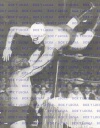 |
 |
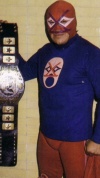 |
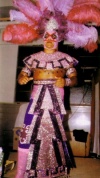 |
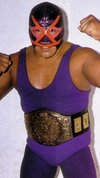 |
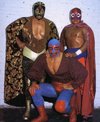 |
 |
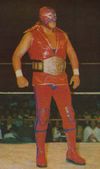 |
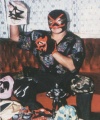 |
 |
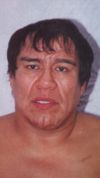 |
 |
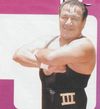 |
 |
 |
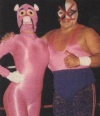 |
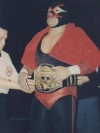 |
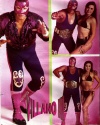 |
 |
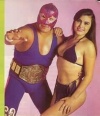 |
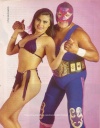 |
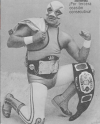 |
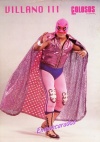 |
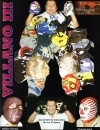 |
 |
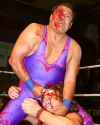 |
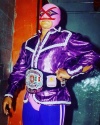 |
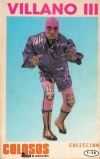 |
 |
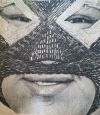 |
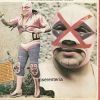 |
 |
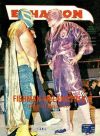 |
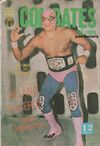 |
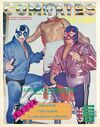 |
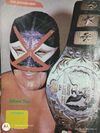 |
| Los Villanos |
|---|
| Ray Mendoza |
| Villanos: I ▪ II ▪ III ▪ IV ▪ V |
